#the thing about thoma is like i don’t think he’s like completely immoral
Explore tagged Tumblr posts
Note
I'm excited to read about how you portray thoma because in game he gives such a wholesome vibe and i feel like we forget the part where he bribed our way into inazuma with pretty words or the fact that he is ayato's most trusted which implies he might have done some unsavoury things under his command. Wanna see you dissect all the layers his has with your amazing writting
aw anon thank you so much!!!! and i COMPLETELY agree with you. he’s a wolf in sheep’s clothing, 100%. he knows exactly how to smooth talk his way out of any and all situations, using just his sharp tongue as his weapon and leaving no physical casualties. he’s a master at subtly but effectively manipulating you in a way that leaves you feeling kinda weird and confused—like what just happened? are we good friends, or did i just get threatened? i feel like whenever thoma deals with those ‘special matters discreetly’ he leaves whoever’s on the other side of the conversation feeling almost unsettled, because the look in his eyes does not match the tone of his words. there is something off, odd, not exactly right here, but it’s so difficult to put your finger on it because he’s so fucking good at masking it, painting poison with a sparkling glaze of stunning varnish and presenting it tangled in a satin bow, simultaneously sticky sweet and bitter.
i genuinely believe he learned how to hone and refine this natural inclination/knack he has for shmoozery from both ayato and ayaka, who also seem to know exactly how to get others to do what they want with thinly veiled threats wrapped up in nice, charming, kind words and friendly tones.
#like pretty much everything in the archon quest involving him is shady#he puts you through multiple tests (a technique he no doubt learned from ayato especially since ayato literally mentions doing the same to#thoma in his voice line about him)#ayaka subtly manipulates and borderline blackmails you into helping her out#the way thoma so nonchalantly takes out ayaka’s fan and begins playing with it in his hands as literally the most subtle threat every to the#kanjou commission guys#anyway#all three are shady#and i love how miko sees RIGHT through ayato hahahahaha#she KNOWS#but waaah anon thank u for ur compliment!!!!!#thoma is interesting for sure with this whole contradiction he has going on#i’m super excited to dig further into him!!!!! ur gonna love him in my modern royal au hehe#the thing about thoma is like i don’t think he’s like completely immoral#his heart is in the right place—in a way. he kind of demonstrates how complex and relative and subjective morals truly are#his heart is in the right place when it comes to the KAMISATOS#but when it comes to others???? well. he’s clearly willing to do unsavoury things in favour of his family/employers#yk what i mean??? anyway i could ramble on forever about this hehe#have a lovely saturday bb and stay safe + hydrated!!!#inky.bb#clari gets mail#inky.thoma
8 notes
·
View notes
Text
What is redeemed in Mansfield Park?
It think part of the reason that I keep dwelling on Mansfield Park is that I’m not entirely sure what Jane Austen meant for the message to be. Because I don’t think it’s just a simple story of Fanny Resists Evil, but then the more complex messages are rather messy.
Mrs. Grant predicts that Mansfield will “cure” the Crawfords, but Mansfield shows that it is rotten to the core. Only 1/4 children are good people (Edmund), Lady Bertram is only capable of selfish love, Sir Thomas is too wound up in his manners to show affection or he’s not there, and Mrs. Norris is actually and maliciously running the show.
So is the message that a failing Mansfield has become incapable of curing?
The only person who seems to really represent and follow the values and morals of Mansfield is Fanny, who while being a genuinely good person, has been verbally abused into compliance. That doesn’t seem like a great lesson. Everyone else utterly fails: Sir Thomas is completely taken in by Henry; Maria is eaten up by avarice, jealousy, vanity, and lust; Tom doesn’t care about his family at all and gambled without guilt through Edmund’s inheritance; Julia hates home so much she elopes; and Edmund, virtuous Edmund, cannot see Mary clearly enough to realize she’s immoral even though she basically tells him right to his face.
In the end, Mansfield is restored, or redeemed, but in a very insular way. Maria and Mrs. Norris are banished. Julia is allowed to visit, but it now married to a man she doesn’t love. Tom has a personality transplant. Sir Thomas realizes that he was wrong. And for some reason, Fanny was delighted to bring Susan back to a version of Mansfield that still contained Mrs. Norris...
I don’t know how much I can respect a morality that can’t retain its own children and cannot convert others. And then we have the whole problem of how are William and Susan good when they’ve been raised away from Mansfield. Is the whole point that Mansfield needs new people to uphold it’s morality?
I have no answers today. Just things that I stuck in my brain.
#mansfield park#jane austen#who is cured?#it almost seems like MP represents an extreme morality that is too far in some way#and london (the Crawfords) are too far the other way#But if your daughter marries a guy she hates just to escape#you've failed as a parent
148 notes
·
View notes
Text
Roman’s reaction when Janus said “My name...”:
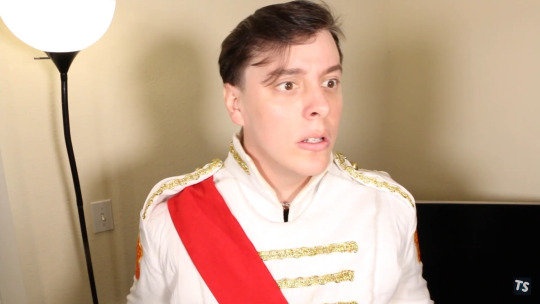
Compared to Patton and Thomas:

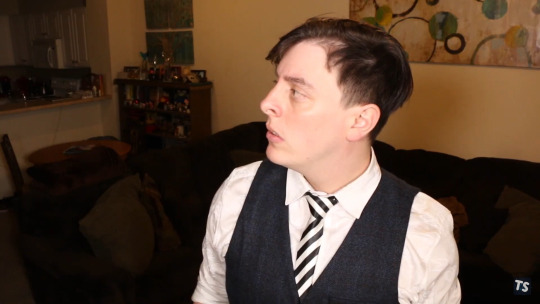
I don’t know exactly what it is, but Roman looks somehow more horrified than simply surprised or taken aback.
It’s almost as if he doesn’t want to learn Deceit’s name.
I haven’t heard much talk about it in the fandom, but I’ve noticed that each time a side’s name is revealed is when more depth and layering is added to their character. They become more complicated and multi-faceted rather then simply being a representation of just one concept.
Let’s take Roman for example. In the first few episodes before his name reveal, Roman was presented as simply “creativity.” Even if he showed aspects of being more complex, he was still viewed only as “creativity.” However, since his name reveal, we the viewers and the other sides and Thomas view him as also encompassing “pride, ego, romanticism, and passion.”
Perhaps to Roman, who was the most adamant of everyone in Putting Others First about not being able to trust Deceit, Deceit revealing his name is a way for him to openly express more parts of himself.
In my opinion, Roman, as the ego and pride, has the hardest time accepting Janus because he knows that once he’s accepted, it will nullify much of past his work and decisions, which were made solely to contradict him as the “villain.” Similar to how he reacted when Virgil ducked out, viewing it as a good thing since he didn’t see the benefit in Thomas having anxiety and still holding on to the idea that Virgil was simply a “villain.”
Much like Patton, Roman is based deeply in his own moral integrity as a prince and a hero. Patton is the one who morally made the distinction between the main sides and dark sides, while Roman was the one who enforced that line (and also gave them their label.)
“We can’t trust him. He’s asking us to go against things we’ve known for years. Rights and wrongs, shoulds and shouldn’ts. How can’t we trust him?”
However, now that Patton, realizing how his distinction and strict rules have only hurt Thomas, has admitted he doesn’t know what to do and decides to listen to Janus, Roman, who has been acting based on Patton’s call, is now loosing sight of what it is he’s meant to protect and enforce.
Deceit now having and revealing his name is a sign that he’s ready to offer more to the table that simple lies. He wants to protect Thomas’s well-being and mental health through use of selfishness, and the others (Patton and Thomas) are welcoming him to do just that.
Unlike with Virgil’s ducking out, Roman wasn’t the only one who viewed Deceit’s contributions as needless and immoral. Both Patton and Virgil did not agree with his methods and became upset with Roman when he sided with him In SVS (and by default in Can Lying be Good). He himself sided with Janus and was burned, but now he’d being burned for not siding with him.
Roman, who for years upheld the belief with Patton that that way of thinking was wrong, had now been left alone in that sentiment and is loosing track of what role he is supposed to be serving. Yes, Roman is still creativity, but that is only a part of who he is. His ego and pride have been bruised, and his passion surely has been dwindled somewhat.
So when Janus reveals his name, Patton and Thomas react like this:

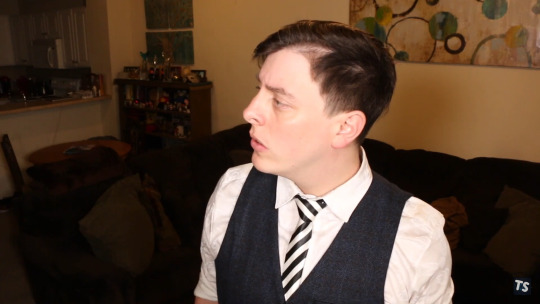
While Roman reacted like this:
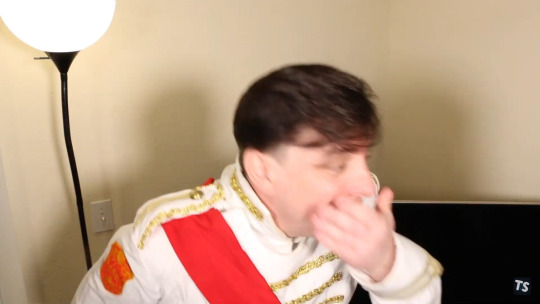
When Roman laughed, it wasn’t simply to be rude. But it was to down play the impact and importance of his name, and attempt to sway the others into ignoring Janus.
That obviously backfired and we are left with one final nail in the coffin, this conversation between Roman and Patton, the two sides who worked together the most to maintain Thomas’s integrity:
“Did you forget that he’s evil! You’re not, or you’re not supposed to be. You’re supposed to be good! You can’t-”
“Roman, everything’s gonna be okay kiddo. We love you.”
“Right...”
Through out the whole video, Roman was letting Patton take the lead with the decision making. He gave him scenarios and let Patton decide what was the correct thing to do, even if he personally didn’t completely agree. However, now the one he relied on has himself become lost, stranding Roman in a place of uncertainty and insecurity.
In a desperate attempt to maintain the order he had fought so long to uphold, he tried to make sure Janus didn’t get into the group and gain influence, or else everything he’s done and believed in would fall apart. His role as a hero would become meaningless.
And that happened.
A/N: I don’t know if this made a lick of sense, I really just wanted to show Roman’s shocked/scared face and then started rambling. If you disagree or have a critic, cool.
#sanders sides#thomas sanders#roman sanders#patton sanders#janus sanders#deceit sanders#ts theories#ts theory#roman angst
4K notes
·
View notes
Photo

Who do you think you are? S1E1 Ghosts rewatch - random thoughts 1. I’ve spent far too long studying the “family tree” from the solicitor’s and I can’t reach any conclusions... I’m going to assume it was just a prop and not actually planned out (however, if anyone does want an extensive discussion I can bullet point my thoughts) 2. Why is Heather Button alone? Sure, she may not have any living relatives, but she needs a wheelchair, and the bedroom is an upstairs one (the one the Captain takes over). 3. Why is Humphrey’s body so clumsy? Dropping his own head seems unlikely... and no-one seems to have caused it. 4. Does each ghost have a “private room” for the night? That means there’s at least 9 in the house, 8 for each ghost - and one for the Captain to move to. 5. When Thomas starts his poem (in, I believe, trochaic octameter), Fanny and the Captain are the first to leave. Kitty, after trying an encouraging smile, and Pat are the last to leave. 6. Robin plays chess with Julian so presumably Julian has to move all the pieces - so he does in fact move more than cups at the beginning (unless he means pushing things onto the floor). 7. Pat trying to remain encouraging but his voice quivers when he says “give us something to look forward to”... 8. What was the AOB for Robin and Julian? 9. Poor old Thomas - he could easily go somewhere private to do his work, but when Julian attacks him, Kitty is straight up to defend him. 10. Why do we never hear the grandmother clock chime again? I can’t imagine that Alison and Mike were happy with the clock never being right, but maybe the ghosts explained it, and Fanny continues to fall out the window every morning. 11. Alison and Mike obviously love a sing-song (in the car), so why does he randomly make an awful song when they enter the cellar? [”don’t be scared”] 12. When Fanny attempts to explain the reason for her falling, none of the ghosts seem to want to hear her explanation - which is the opposite of their interest in Mary’s witch trial. 13. WowAH 14. Before the idea of turning the house into a hotel, only Julian and Fanny seem against them. Afterwards, Robin, Julian, Mary and Thomas (only if they become ghosts and are stuck with them) are for “killing them”; Fanny (”immoral”), Kitty (”wrong”), the Captain (”stuck with them”) and Pat against. 15. However, they’re all happy to try haunting them away. 16. Mike vs Pigeon part 1 17. Jemima - lives in the pantry (and not in the cellar with the other plague ghosts?). Captain, “... your skills... huhah...” 18, Humphrey’s head has moved from the bedroom. Who is moving him? Is he moving himself around? 19. The plague ghosts show that all the ghosts can learn about the modern world just by being around and picking up words and observing 19. Am I the only one who doesn’t believe that Julian tips Alison over through the window? It’s completely possible to overbalance - she lifts both feet off the floor. 20. Answer the question, DAMN YOUR EYES! 21. So, all the ghosts (at the time), watched the manwich going on - do they like to follow the living as a general rule... or was it the activity they were interested in? Or were they nosey about the secretive nature of the meeting? 22. So, has Kitty been keeping an eye out of the window since the accident? I think so. 23. During her stay in hospital, the ghosts would have seen the surveyor, surely? And possibly the workmen if they came to quote and look at the house at some point... 24. Alison noting that Julian wasn’t wearing a hard hat, but didn’t see the lack of trousers... 25. Great final shot of the ghosts coming through the walls, and Humphrey turning up too.
#bbc ghosts#s1e1 rewatch#some questions#some observations#great writing and characters#love that even at the beginning you can tell that some ghosts have their favourites
46 notes
·
View notes
Text
Side Tracks opinions part 1: Janus
(Yes I’m staring with Janus and going backwards, I just need to talk about this snake man right now!)
Alright, I’ve seen lots of people give their takes on each of the sides playlists, and honestly... I feel like they’re not all that similar to my interpretations. I mean yes anyone can interpret the songs how they’d like, but some people just flat out ignore canon to see the songs as their ship instead of what I believe they are actually meant to be seen as. Anyways... Janus! Yes let’s go through each song one by one 💛
1) Black Hole Sun: I’ll admit this one was hard for me. The song is obviously so Janus, with plenty of references to snakes and lying, but I can’t seem to put a finger on the exact meaning. If I had to guess, it’s showing Janus’ fist instance of fearing society. He’s realized that the world is not a safe place for Thomas and no one can be trusted (“Times are gone for honest men” “no one sings like you anymore”). He longs for the ignorance of childhood when society didn’t seem to pose a threat and Thomas wasn’t aware of the dangers and lies it held, but he knows that someone has to protect him from it, and that is Janus (“my youth I pray to keep” “hang my head, drown my fear”).
2) Seemed the Better Way: To me, this is a song about Janus knowing his place as a dark side and knowing that the others will not listen to him (“I better hold my tongue” “better take my place”). He initially trusts the core sides to do what needs to be done and take care of Thomas adequately, but when he realizes that it isnt enough, he finds it hard to keep in hiding (“Seemed the better way” “now it’s much too late to turn the other cheek”).
3) Anywhere: A BIG middle finger to society (“It’s a beautiful world, if youve been lied to” “No no no, nothing in this world is beautiful”). Janus basically trusts no one in society, not even the people closest to Thomas because he believes that everyone will do whatever it takes to get what they want (“Every man standing on another man’s back”). He also believes that society has been a huge detriment to Thomas and, AGAIN, is very dangerous (“It’s the world’s excuse for being disfigured and lying to you”).
4) Talking at the same time: This song is about Virgil. The song begins with explaining that a hard time for one person can be a triumph for another in multiple different metaphors (“Umbrellas cost more in the rain” “hard times for some, for others its sweet” “someone makes money when theres blood in the street”). The next part of the song practically shoves it in your face that it’s about virgil leaving (“Well she told me she would leave me, I ignored all the signs” “I know you're leaving and there's no more next time”). Janus was clearly hurt by Virgil leaving and it seems like he was almost in denial about it happening. A line near the end of the song that I found particularly interesting was “Well we bailed out all the millionaires, They've got the fruit, We've got the rind”. This line to me shows that Janus and the other dark sides let Virgil go, possibly in an attempt to get all of the dark sides accepted. Virgil capitalized on this opportunity and of course, got accepted, however, he left the others behind. Despite wanting Virgil to get accepted by the light sides, Janus remains bitter that Virgil was the only one. Virgil got the fruit, and the rest of the dark sides got the rind.
5) All the Good Girls go to Hell: Janus believes that Thomas needs to listen to him if he is going to stay safe and healthy. He thinks that his assistance, above all other sides, expecially Patton, is crucial for survival in this messed up world. (“And once the water starts to rise, And heaven's out of sight, She'll want the devil on her team” “Look at you needing me”). You’ll find it a common theme in this playlist that Janus refers to himself as the devil or an evil entity of some sort... Just thought I’d point that out.
6) Denial: Well, its in the title folks! Thomas is (or was) in denial. Janus is aware of the moments when Thomas thinks about consulting him or using one of his functions, but almost as soon as he gets the idea, he drops it and acts like the thought never happened (“Don't just shut your eyes closed” “You know that I can hear you thinking, I've heard you all the way from here, But if I look you in the eye though, It's like your thoughts all disappear”). Thomas is struggling for answers to questions that only Janus can answer, but he refuses to listen to consult him and Janus desperately wants this to stop (“I know you're looking for direction, I know where you wanna go” “Please don't turn the light out, I don't think the conversation's over”).
7) Trust in Me: Obviously, the original song has much more sinister undertones, but when listening to the song from Janus’ perspective, I get a different vibe. Basically, Janus just wants Thomas to trust him and give him more reign over decision making. Not much for this one.
8) Razzle Dazzle: JANUS IS EXTRA! Is anyone shocked? Also a HUGE showman. But again, no one’s surprised. Janus believes that the only way to get the light sides to listen to him is to practically put on a show to cover up whatever his true intentions are (“How can they see with sequins in their eyes?” “Razzle dazzle 'em And theyll never catch wise!” “How can they hear the truth above the roar?”) I could keep listing lines but theyre literally all just different versions of the same sentiment.
9) When the Chips are Down: The title right off the bat shows that, again, Janus believes that Thomas needs to look to him when important decisions are on the line. There are also a lump sum of jabs at patton in this song, lines like ��Aim for the heart, shoot to kill” and “Cast your eyes to heaven, You get a knife in the back”. Theres also a lot of lines, yet again, of Janus practically begging Thomas to trust him and no one else (“Ain't nobody but yourself to trust” “Help yourself, To hell with the rest, Even the one who loves you best”).
10) Mandy goes to Med School: Soooo this one... Honestly, I don’t really have a lot. The original meaning of the song is not very applicable to Janus, so its a bit hard to pinpoint its meaning. The only thing I can think of is that Janus is again hating on society and the crazy things that people have to go through in it. If you weren’t aware, this song is about coat-hanger abortions.
11) I put a Spell on You: This one seems pretty striaghtforward to me. Janus knows that Thomas doesn’t want him, and it drives him up the wall, but he does what a snake boi does and slithers his way in anyways (“And I don't care if you don't want me, I'm yours right now” “I can't stand it 'cause you put me down”). I suppose you could argue that you could replace Thomas with Patton (mostly because daddy is used like 10 times in the song 😂) but a later song covers their realtionship extremely well.
12) Evil Night Together: Another toughie. My gut feeling is that this is a song about Remus and Janus just going out and having a wild night together. As I read into the lyrics more, though, it seems almost like Janus is doing this for Remus. Like he wants Remus to feel accepted and loved by him (something that can’t be said by Thomas). I just can’t read some of these lines without getting big Momceit vibes... i mean... theyre so supportive! “I'll hold your hand while they drag the river” “I'll cuddle you in the undertow” “I'll hold you close while they dust for prints”. Then theres of course this line... “Who's gonna make you a hero?” And to me, that is Janus saying that, if Thomas only sees Roman as his hero and not Remus, then it is Janus’ job to make Remus feel like a hero. Janus also saying “No need for cake or flowers” also feels like him reassuring Remus that he doesn’t need to be like his brother to be perfect and loved.
13) Don’t tell Mama: I think I’ve seen some people interpreting “mama” as Thomas in this song, but to me Patton seems like a better fit, especially after their interactions in the most recent episode. Basically this song is all about how Janus doesn’t mind people knowing about the bad things he does, but he can absolutely not have one person know. Janus seems to have grown a soft spot for Patton in the new episode and if you ask me, he would definately not want patton finding out about some of immoral things he’s wanted Thomas to do. I mean he literally waits for Patton to sink out and then the second he’s gone he starts scheming about pushing people down stairs and sabotage.
14) You’re a Cad: Another Virgil one, but this time it’s after Virgil’s acceptance. I think Janus has little faith in the beginning that Virgil would get far in his journey to the light side. Whether that is because of envy or just plain pessimism, I’m not sure, but he definately doubted Virgil would ever be able to escape his past (“So now you want the whole world to notice that you've come around, Now you expect, We'll see how you're really so much better now, But I know the truth” “What's the point pretending that you could be a better man, Just give in, since you always end up right back where you began”). Despite his reluctance to support Virgil’s endevors, Janus shows a softer side for Virgil that has gone completely untalked about in canon (“You're a rascal and a rogue, a villain and a crook, Still I tug at your line, I'm a fish on your hook” “Still I know the truth, but I have a sweet tooth for a Cad and a bounder, a dog and a cheap”). Janus really misses Virgil and I would go as far as to say that he regrets the things that he’s done to make Virgil want to leave (“I should be better, but I'm worse” “You're reckless with my heart, still I wait by the phone”).
15) As far as I can See: A sadie but a goodie. Janus doesn’t really understand love, but he’s sure that no one loves him (“As far as I can see Nobody loves me”). No one listens to him, no matter how much he shouts and cries. He doesn’t believe that anyone could love him if they are unwilling to hear him out and communicate with him (“As far as I can see, Nobody's listening” “And when I'm crying out, Nobody cries back for me”).
16) Criminal: AH MY FAVORITE SONG ON THE PLAYLIST! I LEGIT CRIED MY GUYS! Anyway. Janus LOVES Thomas. I would go as far to say that Janus loves Thomas more than any other side. Despite his lacking knowledge of love and what it feels like, he knows for a fact that what he feels for Thomas is the closest thing he will feel to love (“Because he's all I ever knew of love”). Now that thats out of the way, lets get to the juicy stuff... Janus feels like a criminal as he’s been taught over and over again that his opinions and thoughts are bad and harmful (“Cause I'm feelin' like a criminal” “I've done wrong and I wanna suffer for my sins”) This song is ultimately about Janus wanting to improve for Thomas, the one he loves the most. He knows that Thomas needs him, and the only way to get Thomas to listen is to get some help. Whose that help you might ask? Patton. Janus wants to be more helpful, but he doesnt know how. He’s envious of Patton’s ability to be accepted so easily, so he goes to him for advice (“I've come to you cause I need guidance to be true, And I just don't know where I can begin”). Janus wants to be redeemed in Thomas’ eyes, he wan’ts to escape the criminal appearance he’s been doomed to (“And I need to be redeemed, To the one I've sinned against”). He HATES some of the things he does to Thomas and some of the things he makes him think, but he doesn’t want to be forgiven, he believes that he deserves to be punished, but he still wants to get better for Thomas. He just doesn’t know how to do that (“Oh help me, but don't tell me to deny it, I've got to cleanse myself Of all these lies til I'm good enough for him”). Also, Janus sees Patton in a very very high place. He goes as far in this song to liken him to an angel while comparing himself, again, to the devil (“So what would an angel say, The devil wants to know”).
17) Change: The song is about, you guessed it, change! This to me is a continuation of the last song. Janus finally feels like things are changing in his favor (likely after the most recent episode). He was beginning to feel like there was no point in caring or trying, but now that he’s begining to see the light, he’s grown a bit hopeful (“Lately I've been thinking it's just someone else's job to care, Who am I to sympathize when no one gave a damn?” “Trying to find the power in me to be faithful” “Change is a powerful thing, I feel it coming in me”). With Patton’s help and acceptance, Janus is begining to feel worthy of Thomas again and begining to see the he has a voice (“Maybe by the time this song is done I’ll be able to be honest, capable, Of holding you in my arms without letting you fall when I don't feel beautiful Or stable”).
18) Devil in the Details: Janus worries again about his ability to help Thomas. He doesn’t believe that he can tell the difference between good and bad and he looks to Patton for that differentiation (“There was love I meant, there were accidents, So tell me which is which. 'Cause I just can't work it out” “I have, no way, of knowing,…”). There’s also an odd underlying message about doing something that he doesn’t want to do, but continues to do despite this and I’m not quite sure what that could be referring to (“And I know the cost, and I want to stop. But I can't do it, I just can't do it.”). It could simply be referring to him lying or deceiving others, but that seems too simple. I wish I had a better answer.
19) Come Little Children: ALSO MY FAVORITE SONG ON THE PLAYLIST! This is really big guys. This song practically confirms the fact that Janus was in charge of taking in and hiding the dark sides from Thomas (“Come little children, I'll take thee away Into a land of enchantment”). The song literally uses the phrase “My garden of shadows”, a clear metaphor for the hidden parts of Thomas’ mind where Janus keeps the dark sides. But it gets better... Janus pities these poor sides. He hates the way that society has forced them away from the light and into the shadows (“Follow sweet children, I'll show thee the way Through all the pain And the sorrows”). Not only does Janus feel bad for these sides and longs to protect them from the cruelness of the real world, but he LOVES them. He values every aspect of them and thinks they are beautiful and perfect. He cannot fathom why society wouldn’t also love see them this way and it frustrates him to hide such amazing traits from the world (“Weep not poor children For life is this way, Murdering beauty and passions”). Despite this sadness and dissapointment, Janus does his job and keeps the dark sides hidden away, knowing that society would never accept them for what they are (“Hush now dear children, It must be this way”).
20) Into the Unknown (no not the Frozen song): This song is VERY IMPORTANT. I have seen so many misinterpretations of this song, and granted mine could also be wrong, but please hear me out. This song comes right after the last song for a reason. The sides that Janus had once hidden away are now being shown to Thomas. He is literally going into the unknown (“Led through the mist, By the milk-light of moon, All that was lost, is revealed.” “Somewhere lost in the clouded annals of history, Lies a place that few have seen. A mysterious place, called The Unknown. Where long-forgotten stories are revealed to those who travel through the wood.”) Thomas is figuratively traveling through the wood by learning more about himself and traveling deeper into Janus’ previously mentioned Garden of Shadows. The song ends, beautifully framing Janus’ love for the sides he’s raised and hidden away, calling them “ The loveliest lies of all”....
(Ahhh! I’m sorry that was so long guys 😅 Thank you if you read the whole thing or evern part! I’d like to hear your opinions, so let me know 💛💛💛)
#sanders sides#thomas sanders#ts sanders sides#ts unpopular opinions#ts janus#janus sanders#janus playlist#ts side tracks#janus’ playlist#sanders sides playlist#long post#ts sidetracks
215 notes
·
View notes
Text
Analyzing Sanders Sides using Psychoanalysis
Note: I don’t know much on psychoanalysis only the basics, just saying. so this might a low quality analysis using it due to my basic of the topic
Psychoanalysis basically for context is an approach of psychology that believes your behavior is the result of your unconsciousness and conflicts from early childhood. Basically you are controlled by forces outside of your awareness that are due to events from your childhood. I’m going to mostly be focusing on the 3 levels of awareness of the mind according to the theory, the unconscious, the subconscious, and the conscious.
It is established early on that Logan, Roman, and Patton are basically the key or core aspects of Thomas. They are who he is meaning in turn they are also who everyone sees. They are aspects of Thomas’ consciousness. The conscious for part of your mental process, involving the ability to talk and think in a rational way, it consists of the things we are aware of. Thomas is aware of his wishes and dreams, his passions, he is also aware of his feelings/moral compass, along with thought processing and logical thinking. These are aspects of his consciousness or as the fandom calls them, The Light Sides. Roman would in a way seem to be a larger, more prominent part of Thomas’ mind with his creativity shining through frequently and being something people notice.
In the subconscious of Thomas’ mind Patton and Logan also have a prominent part in. The subconscious is a level of the mind that isn’t as easy to access though it is still a level one would be aware of, it deals greatly with memories and stored knowledge. Patton’s room of Thomas’ has many memories stored in it, it is basically where all his memories seem to reside. Patton having such an impact on the storage of his memories and holding them shows he is largely a part of Thomas’ subconscious as much as he is the conscious. Logan being the logic of Thomas makes sense why he would be a part of the subconscious. Logic and Morality like Patton is, isn’t constantly always needed, so they may reside in the subconscious. Logan thought being logical would make sense for him to be in charge of the stored knowledge of Thomas’ mind, holding the past knowledge he has gotten through his years, though not always is all the knowledge always needed.
In the unconscious of Thomas’ mind are, as the fandom calls them The Dark Sides, Janus, Remus and Virgil. Though Virgil may now be a ‘Light Side’ he still resides in the unconscious of Thomas’ mind though he is just an aspect Thomas has grown to be aware of and notices, though before he may not have noticed him as much, he wasn’t at all aware of Virgil at the time unlike how he is now. The Unconscious is the largest part of the awareness of the mind, the unconscious is where everything that has been repressed, pushed down, and ‘forgotten’, resides. It deals with things like selfishness, shameful experiences, immoral urges, and fears. Virgil being anxious is tied to fears and Thomas’ shameful experiences things that would give one anxiety remembering. Virgil is an aspect that would affect the behavior of Thomas without him being aware. Janus also would be a part of the unconscious, his whole character is an aspect Thomas had no clue he had, he didn’t know about it, he was unaware. Janus lays in the unconscious affecting Thomas though he is unaware of the effect to his personality and behavior (until he revealed himself…). Janus was able to even affect the other sides without Thomas knowing, able to stop them from talking about him. Janus as deceit is an aspect that Thomas would've suppressed and ignored, it is something he would rather not acknowledge, making him a part of this unconscious level of mind. Remus is one that would definitely fit well in the unconscious category. A big part of the unconscious is that it slips out sometimes, trying to get out accidentally. This could be apparent in dreams where the unconscious could slip into the awareness, this could also be shown in Freudian slips, when one says one thing but means another thing. In Remus’ reveal when he was brought to the awareness of Thomas it was after a bad night of dreams. Thomas expressed violent motives in these dreams that Remus brought up, though they would never be acted on they were simply brought to Thomas’ attention. Because of who Thomas is he had suppressed this half of his creativity the more PG-13/R rated creativity. Though Remus was slipping out and bringing himself to Thomas’ attention, making Thomas aware of this aspect he wasn’t completely aware of.
All of the sides are aspects of Thomas, none inherently bad or anything. There isn’t really a Dark or Light side with this type of thinking. There are parts that Thomas is aware of and not aware of, there are the Conscious and Unconscious states of mind where sides may lie. All are a part of him, who he is, and his personality, just some he is more aware of and in away accepting of than others, some are repressed and ignored then in a way forgotten though they are still there remaining.
#sanders sides#TSS#tss fandom#sanders sides analysis#psychoanalysis#sanders sides theory#roman sanders#ts roman#logan sanders#ts logan#patton sanders#ts patton#remus sanders#ts remus#Janus Sanders#ts janus#virgil sanders#ts virgil
39 notes
·
View notes
Note
Is the "professor x just made a bunch of child soldiers" argument as tired as the "If Batman donated all the money it took to become Batman he'd do more good" line?
.No, but I think there’s an interesting reason why it’s not, and it has a lot to do with textual intent.
In Batman comics, Batman IS the solution to the problems with Gotham City, which we know because WE ARE READING BATMAN COMICS AND THAT IS THE PREMISE, AND IF YOU DON’T UNDERSTAND THAT YOU DON’T UNDERSTAND FICTION. Billionaires in the real world? Terrible, inherently immoral. Billionaires in the fictional universe that has shit like Green Lantern rings and x-ray eyes? Literally the only thing keeping a crocodile man from eating your face. Bruce Wayne is a philanthropist on the side, but, as I’ve written before, writing a check to the local school district or offering comprehensive health insurance to employees of Wayne Industries does not solve the problem of A Murder Clown Is Poisoning The Water Supply Right Now. I do not understand why people claim they want to see fucking Batman meet with his accountant and figure out if construction of the Thomas and Martha Wayne Memorial Humanities Building at Hudson University is a good tax write-off for 20 God damned pages every week, which I assure you they do not actually want, but that’s not the point, really. The point is disingenuous refusal to engage with the text. The actual text of Batman comics is that Batman is a good idea.
The actual text of X-Men comics is that Professor X gathered teenagers and, in the guise of a school, turned them into a secretive paramilitary strike force that went on missions where they were sometimes killed. The argument is whether that’s the best way to go about things, which is an argument that people have within those comics. The text tends to come down on the side that he was right to do so because the alternative is getting murdered by giant purple robots made of racism, but there’s still an exploration. It’s why Cyclops is an interesting character, because he’s The Most X-Man — the guy who found out at 15 that he had to learn how to be really good at aiming the uncontrollable laser beams concussive force blasts that shoot out of his eyes because the alternative was that he and everyone he cared about was going to die. Like, that’s something that’s gonna fuck you up pretty bad, but according to the past 50 years of X-Men comics, it’s also 100% true.
With Batman, the question is not “why doesn’t Batman provide real solutions to to the real-world root causes of crime” — because that’s an astoundingly stupid question to ask — it’s “how is Batman going to solve the problems that are presented to him in this fictional universe that is uniquely built around him?”
With the X-Men, the question is usually “how are the X-Men going to survive this experience?” The idea of questioning whether Professor X was wrong all this time is a core component of that.
The former is refusing to engage with the premise. The latter is asking the questions the premise invites. If you don’t like the premise, you don’t have to engage with the media. There’s a lot of stuff out there and if you don’t like Batman because that idea doesn’t make sense to you, I’m not going to hold it against you. I will, however, hold it against you if you try to break the premise to make it worse.
Here’s a huge tangent where I just know I’m gonna get lost in the woods:
I actually feel a similar way to opinions I’ve seen about the MCU, and how it’s built around a very militaristic idea of superheroes, which makes some people uncomfortable. And, you know, that’s fair! Those movies are built around that idea, because they were built on the foundation of a movie that was the absolute embodiment of transitioning from traditional action movies (ie, stories about loose cannon cops, spies, space marines, Kurt Thomas, and other heroes who usually have the backing of a larger organization) and superhero stories (which are almost always about heroes acting independently of, and occasionally in opposition to, those same larger forces). Those movies never really get away from the idea that Tony Stark, the guy who sets the tone for the entire roster of films to follow, is fundamentally a dude whose primary character trait and fatal flaw are that he always believes he can solve his problems by building a bigger gun. The militarized aspect of S.H.I.E.L.D. and the Avengers spins out of this as both a structural result of the action to superhero genre transition, and as a convenience to get Iron Man (former defense contractor), Captain America (literal soldier), Black Widow (spy), the Hulk (military scientist) and Hawkeye (for some reason a spy like in The Ultimates and not a redneck carny like he should’ve been). The odd man out is Thor, which, for all the problems with those first two Avengers movies, is why he first shows up as an antagonist in the first one and then completely bails on the whole thing to go deal with his own stuff on the second one. The military structure is literal plot structure.
So yeah, that gets kind of weird when it filters down to Spider-Man. A lot of that weirdness has to do with things that are beyond the control of the universe, in that Marvel’s most beloved character, the second big success the company ever had whose popularity has endured much stronger than the first one, the flagship superhero who was literally on their paychecks and has never not been popular, had to be a late addition to a universe that already had, like, the Vision in it.
But because they had to work within those constraints, they had to work within the premise they were already given. It makes perfect sense that in that universe, Peter Parker would look up to the world’s most famous superhero nerd, and it makes sense that Iron Man would see Peter as this blank slate that he could stop from making the mistakes that had defined his life. That, to me, is a really interesting dynamic, but it’s also one that requires Spider-Man to take a lot of cues from Iron Man, which is not a dynamic that those two characters ever had in the source material. It winds up giving them different consequences.
And like, if that’s not your thing, I get it. Spider-Man being recruited by the superhero military and having a high-tech suit that talks to him is a jarring shift, even if they do a good job of bringing in most of the core tenets of the character — something about responsibility and... I wanna say... muscles? Is it muscles? — which I think they did. But, if you don’t like that setup, which is a product of the larger universe, then you don’t have to buy into the premise. Like, yeah, it sucks that you’re fundamentally not going to dig this Spider-Man movie, but how do you think I feel? I’m a Batman guy and I literally have to see these movies with their endless terrible premises for my job.
Back when Far From Home came out, I remember seeing someone talk about how the MCU Peter Parker was fundamentally flawed because he didn’t have Uncle Ben, and I don’t think that’s correct. For one thing, Spidey pretty clearly has an Uncle Ben in that movie, it’s just that the reference to him in Civil War is a little less explicit than it usually is, presumably because we’ve seen Uncle Ben die on screen like five times since 2002. Second, it actually makes it make more sense that he’d latch onto the next influential father figure who walked through his front door. Third, even if we got way more Uncle Ben in those movies, it wouldn’t change the fact that the Peter/Tony Stark relationship and the way it played out was a function of the larger universe and the way those two characters had to interact within it. I don’t want to generalize too much or claim to know what people are thinking better than they do, but I’d suspect that if you don’t like that stuff in Spider-Man, the thing you really don’t like is the larger structure of this take on the characters. And that’s fair!
That’s not to say that a premise can’t be bad, or that a twist on a character that posits a new premise is always good by nature of including some of the stuff that works. Again, I’m a Batman guy, and the last three movies to feature Batman are bad partly because the premise is fundamentally broken (the other parts are literally everything else about those movies because they are irredeemably terrible on virtually every level). But, you know, none of them have Batman writing a check instead of fighting crime, so that’s something.
--Chris
989 notes
·
View notes
Text
I'm back on my bullshit (watching putting others first again) and it hurts so much??? Patton's role as a side is definitely more heart/emotions/compassion than morality, but he’s still Morality, albeit very much a Sunday School form of it, and, well, "love thy neighbour" is the golden rule, according to the book that my primary school was themed around
Unfortunately, Patton is human. well, part of a human. He isn’t perfect. He doesn’t know everything, but he’s also the dad guy. He’s got to teach his kids (who are very insistent that they’re not his kids) when they ask about the world
In SvS, Thomas essentially asked Patton to simplify ‘good’ and ‘bad’ into clearly divided concepts with no overlap, because Janus had twisted “go to the callback” to “go to the callback and lie about what you’re actually doing” to ultimately making everything about being a ‘good’ or ‘bad’ person
Patton’s problem wasn’t that he was being overly moralistic or whatever. I think that, if Janus didn’t skew Roman’s “hospitalised Aunt Patty vs. something good” comparison into a blatant suggestion to lie about something serious without any real necessity, and if he hadn’t turned it into a battle of ‘good’ and ‘bad’, then Patton would have agreed pretty easily to the callback. Like, Thomas could have been honest with himself, and said that he wanted to go the the callback instead of the wedding, but he didn’t. Janus tried to get him to do that (congratulations Janus!!!), but he messed up his Logan impression, immediately gave up, and took Thomas to court over it. He set the whole thing up as, essentially, an argument between himself and Patton, and presented himself as an attacking force rather than an advocate for Thomas’s wellbeing. Then again, that can kind of be explained by the fact that Thomas himself isn’t comfortable with self-advocacy. which. big mood
And that’s Patton’s problem. Sunday School morality. “Love thy neighbour.” To be good, the most important thing is to love other people, and treat them with kindness and respect. What would Jesus do? Jesus died in penitence for humanity’s sins. The morality you learn as a child in those illustrated bibles says that Jesus is the kindest, best, most perfect person, and by dying, he made everything better. His conflict and fear regarding his imminent death exists as “let this cup pass me by,” but he soon accepts it, as, “Your will be done.”
Fun fact that’s a bit of a digression! The Agony in Gethsemane is conveyed, in the musical Jesus Christ Superstar, as a six-minute rock ballad, ending in his acceptance as a sacrifice, but asking God for it to happen “now, before I change my mind.” He kind of gets to be more selfish. He gets to be angry about his impending demise. Now, which character took up half an endcard delivering various musical puns after his introduction episode?
Back to neighbour-loving. It’s an incomplete quote. The full (or, well, a fuller) thing is “Love your neighbour as thyself,” or, in plain English, “Love other people as much as you love yourself.” Not more than, but not less than
That’s Patton’s problem. Not just as a compassionate Morality, but as an empathetic heart that feels what other people feel, Patton is concerned with the external; with giving love. Jesus is the pinnacle of a ‘good person’, and his death is necessary for the wellbeing of others. His Father made him with the intention of him dying at thirty-three in order to make up for everyone’s sins. And, well, if Patton’s the dad guy... I may have just committed blasphemy. Cool! I didn’t know I knew how to do that!!!
Janus is the snake with the forbidden fruit. He offers knowledge; understanding; independence; freedom. In the ignorance that drives you to learn, condemn everyone with your inability to blindly trust authority. Think for yourself. Exist as yourself. Be yourself; a self; an individual! Bask in the sensation of being! Seek pleasure, because what else does the ability to feel good exist for?
Doing good feels good. That’s okay. It’s okay to seek pleasure. It’s not a sin to feel nice
While Patton is focused on others, Janus is focused on himself; on Thomas. In fearing Deceit, Thomas also feared loving himself. How can you love your neighbour as much as you love yourself when you don’t love yourself? When you subconsciously treat yourself as less worthy of love?
And the thing is, Patton’s aware of that, at least on some level. The video begins, and Patton is hyperaware of everything he’s doing wrong. He constantly corrects himself. He tries to make himself non-threatening, because he’s been a threat to Thomas, and he knows it. He tries to be kinder and gentler. He’s being asked the difference between ‘good’ and ‘bad’ two episodes after he had to completely separate the two, and one episode after he learnt that he shouldn’t do that
Thomas didn’t want to be a bad person. Therefore, Patton had to make Thomas a good person. Patton swore on a youth bible, guys. He’s not equipped for complex moral issues. He’s painfully aware of his own imperfections, and he tries his best to express that he probably shouldn’t be the authority on these things. He says “maybe,” and “who knows,” because he doesn’t know, but he’s being asked anyway
Patton isn’t an actual dad. He’s more the dad friend than anything. He’s not an authority, but he’s being put into that position, and he’s being asked questions that he doesn’t know the answer to. He’s learnt a little bit more, but the courtroom had him divide things into ‘good’ and ‘bad’; ‘selfless’ and ‘selfish’. It’s broken, now. It’s been split
‘Selfish’ is now effectively synonymous with ‘bad’, because that’s how Deceit presented it in the courtroom. Therefore, you can’t act in your own self-interest and be a good person. Anything that makes you feel good as a primary benefit is immoral. This moral absolutism turns into asceticism. Self-denial for spiritual fulfilment
Literally nobody wanted this, but it’s the logical extreme of black-or-white thinking. Janus pushed Patton to an extreme - to his very own mental health crisis - in order to make his point, which is kind of a dickish thing to do, tbh. Janus might have felt like Thomas wasn’t utilising his “one goal of self-preservation” due to his desire to be a good person, and, well, the actual Roman God Janus saw the past with one face, but the future with the other
I don’t know if this is a normal person thing, or just that I’ve been mentally ill for so long, but, without external events affecting matters, I can usually tell if I’m headed on a downwards spiral. If an external event pops up, which I won’t be able to predict in advance, but which I will be able to respond to, I can predict how I’ll react to that, too. That’s how Janus can predict the future
Janus knew that Thomas was headed towards a downward spiral. He knew that attending the wedding would exacerbate it. He knew that Thomas needed his love to be directed inwards, so he manipulated and sacrificed Patton for it, but, then, since Thomas’s sense of self also involves caring for other people, he helped put Patton back together
i’m so tired i’ve been writing this for like three and a half hours
26 notes
·
View notes
Note
Ummmmm so we seen what could happen when Thomas refuse to listen to Janus and how it would of ended pretty badly for him. As you mentioned about Patton and Janus being a part of the same coin, won't it be just as bad as Thomas not listening to Patton or he just be fine 🤷
I think not listening to Patton would be as much devastating, as it was not listening to Janus.
Let’s recap: Patton is Thomas’ Morality and Heart. Morality is a set of ideas, values and principles that can be from a philosophy, religion or universal. In Thomas’ case (as he said in the very first episode):
[Thomas]: And finally, this is my moral side. My sense of right and wrong that I’ve learned ever since I was a kid from my own parental units.
And this sense of right and wrong is the basis on which Thomas (and any individual in general) decides how to behave.
In addition to that, Patton is also “at the core of a lot of Thomas’ feelings”, as he said during the Nostalgia two-part video.
So I think ignoring Patton would lead to a sort of “reset” of Thomas’ whole persona. Like switching on “off”. Thomas would not be able to distinguish between right and wrong anymore. He wouldn’t be immoral, but amoral. Those are kinda different things: immorality means recognizing something is wrong and DOING it because it goes against morality. Amorality, on the other end, means being completely indifferent towards morality. Rights? Wrongs? Who cares.
And this is something almost impossible for humans because, well, there are things we universally know they’re right and/or wrong. Even a serial killer knows that killing other people is wrong.
Now add the idea of losing “a lot of your feelings”: if you were indifferent before, by losing your feelings you won’t even feel guilt or regret or have the slightest doubt you may do something wrong. So you will become an empty shell, completely indifferent, so detached from humankind to not recognize the right and wrong in your actions. Something barely human.
Please, don’t get me wrong here: this would happen on a (way too) long period of time. I’m not saying that ignoring Patton a couple of times would be this devastating for Thomas. This is the worst case scenario. And it would be barely IMPOSSIBLE to reach that point because, as I said before, everyone knows there are things universally right/wrong.
(Just like it’s impossible to completely shut down your self-preservation for a long period of time: every living creature is naturally predisposed to live, so your self-preservation would intervene in any case, no matter what.)
Moral of the story: everything should be done in moderation. Except planting trees.
#sander sides#sanders sides#sanders sides theory#janus sanders#patton sanders#ts janus#ts patton#ask#very interesting question#brainstorming
36 notes
·
View notes
Text
Orange Side Theory (very long, there's a TLDR)
Many people think that the Orange Side is the complete opposite of Logan, such as ignorance or irrationality. While this is a possibility, I don’t personally think that’s true. I was rewatching DWIT when I noticed another trend for the darksides, other that the -us name endings: The dark sides can all be seen as morally wrong (excluding Virgil).
In Thomas’ belief, lying is morally wrong, which is why Janus is Patton’s opposite, even if he’s not the complete opposite, as immorality would be. The same can go for Remus: he’s not the complete opposite of Roman, like as apathy or pride, but in C!Thomas’ beliefs, Remus is not only creatively wrong, but his contributions are also morally wrong.
This leads me to believe that Logan’s darkside will not only be logically wrong, but also morally wrong. Something that may go along with this is the wrath theories, or possibly even hatred, which is what I believe the dark side represents. My main source for this is the University of Cadiz’s paper “The Psychology of Hatred”, and another theory: the one eye theory. I even have a possible name, but I’ll get to that later.
I’ll start with why I believe the Orange side might be hatred. According to “The Psychology of Hatred” intense hatred can cause “a reversal in the moral code: killing the hated person or group is a right” this not only goes against morals, but logic, following the pattern of the other two dark sides. Another thing they bring up is that “Some people morally disengage from their actions and create excuses for the hatred they feel.” if they morally disengage, that goes against morality, and creating excuses instead of telling the actual reason they feel hatred isn’t logical.
Having hatred towards something or someone is something that Thomas wouldn’t want to believe about himself. So Janus would probably hide that far away from him, and preventing him from knowing about hatred until he believes Thomas is ready to know, or when he needs to know about this side.
Hatred can also cause physical outbursts, which is something we have definitely seen from Logan:

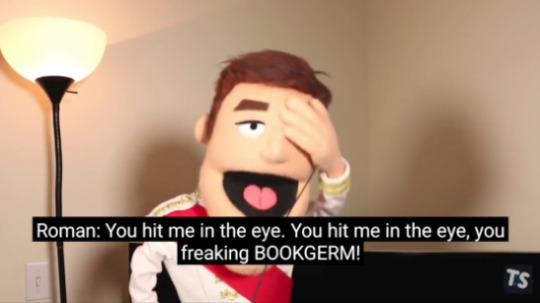
This being said (and shown I guess) Logan definitely has some pent-up anger/hatred. Another thing about this is that Logan’s next line after this was “I’m sorry, I don’t know what that was.” Which is close to what Roman said after his line “May visions of sugarplums dance in your head and hopefully not visions of your naked Aunt Patty.” In the 12 Days of Christmas episode, which was a foreshadowing to Remus.
Those pictures can also be a good transition to the one eye theory, which would lead to my theory of what the Orange side might look like. The one eye theory is basically just that the orange side will probably only show one of his eyes, and it came to be because of these bits in Sanders Sides:
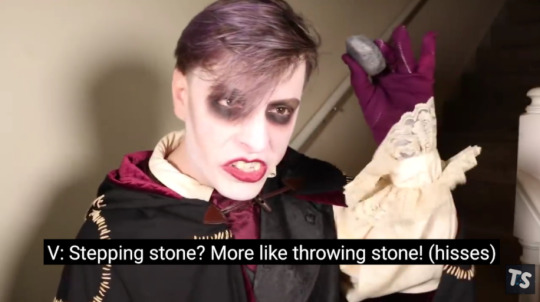
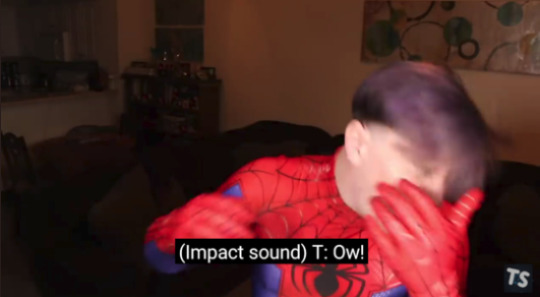

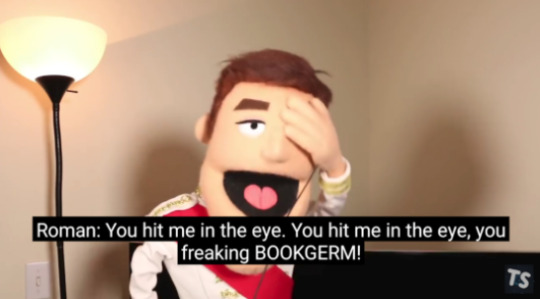
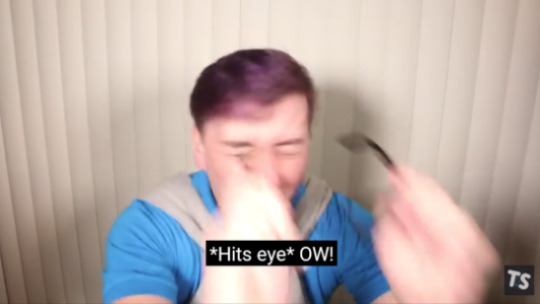
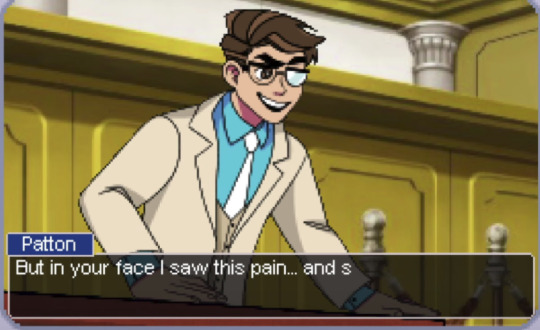
And what else do we know that may only have one eye?
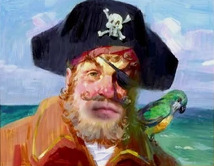
PIRATES!!!
Another thing that could support this is when Thomas offhandedly mentions that people might think he’s talking like a pirate even though he’s dressed as a viking in his Raid: Shadow Legends promo at the beginning of “Are There Healthy Distractions?” Though that could be a bit of a stretch.
There is also the Embarrassing Phases poster theory: the 3 pumpkins at the bottom of the poster represent the 3 darksides. Janus, Remus, and then another one (Orange) peeking around the corner. In the poster, you can only see the orange side pumpkin’s right eye, which leads me to believe that the eye patch with be on his left eye.

There’s also the saying that someone can be “blinded by hate”, which is what happens when you blackout because you’re so mad at someone or something, and you act very irrationally and immorally. Someone usually “comes to” after they calm down, and don’t remember whatever they just did, or they just didn’t realize what they were doing while acting out of blind hatred. It also explains the “Blinding Rage” attack in the Putting Others First scene:

Finally, my name theory: Odious. Odious means “arousing or deserving of hatred or repugnance” according to Merriam-Webster. It is can also be found in the Bible, and if something is described as Odious in the bible, it means that it’s hateful. Odious is derived from the Latin noun “Odium” which means “hatred”. Of course, they may spell it differently. It could be “Odius” or “Odeus”.
You could also change a few things to make it fit the Orange is Patton’s brother theory. Janus is Logan’s darkside (lying is logically incorrect, it’s spreading fiction as fact). Also, the paper I used about the psychology of hatred called hatred a (useless emotion). Just thought I’d add this because I really like that theory.
TLDR: I believe that orange side is a pirate with an eyepatch covering his left eye, who represents hatred and is named Odious (or something like that), and could possibly be Patton’s brother. This has been my TedTalk, have a great day!
9 notes
·
View notes
Text
Ghosts Series 2: ‘They’re stuck in an existence they didn’t ask for… like all of us’
https://ift.tt/35QzhQ6
The Ghosts creators have worked together for over a decade. To-date, the six-person team (Mat Baynton, Simon Farnaby, Martha Howe-Douglas, Jim Howick, Laurence Rickard and Ben Willbond) have written and performed in long-running children’s sketch comedy Horrible Histories, three series of fantasy sitcom Yonderland, feature film Bill, and two series of the supernatural BBC comedy Ghosts, with a third on the way.
Channelling Mrs Merton asking Debbie McGee what first attracted her to the millionaire Paul Daniels, I ask Baynton and Howick via Zoom what inspired the group to write Ghosts, a sitcom about a group of individuals who frequently drive each other nuts, trapped together for what may well be eternity?
Both laugh. “I’m sure we do drive each other nuts in many ways,” says Howick, “but the truth is, like the ghosts, what we always come back to in these episodes is that they love each other and don’t know what they would do without each other. I think that can be said for the group?” He looks to Baynton for confirmation and gets a happy nod.
Considering the well-documented fallings-out and imploding egos of other comedy gangs – the Pythons not least among them – this level of harmony over such a long period feels remarkable. What’s their secret? “I think we keep each other honest,” says Baynton. “There are certainly heated debates.”
Heated’s too strong a word, says Howick. “We only really fight for our opinion, we never fight each other.” On the rare occasion that there isn’t unanimity about a particular topic, there might be a locking of horns and a democratic vote, but real arguments don’t happen. “There’s no animosity or jealousy with each other’s independent careers,” he explains. “We are our most important project. We have no desire to work each other up. We’re all genuinely fond of each other.”
That much is clear watching them interact. The online BBC press launch for series two was punctuated by the group making each other laugh. Silly voices. Running jokes. At one point, to the absolutely delight of his colleagues, Simon Farnaby’s crotch moved unavoidably front and centre as he stood up in front of his webcam to adjust a window blind. The rapport is real.
Indeed, during UK lockdown, say Baynton and Howick, the group’s regular Zoom calls drafting Ghosts series three were a godsend. Aside from the boon of having regular work when so much of their industry was in uncertainty, being able to see friends for three hours on a Wednesday evening kept them sane.
“It’s been a tonic in an otherwise relatively difficult and quite miserable time to have been able to jump on Zoom and make each other laugh with ideas for these characters that we love,” says Baynton. Entertainingly, when the group splits off into writing pairs, each does impressions of the absent characters while drafting dialogue. “It’s funny,” remarks Howick. ‘When we come together as a six, if we’re trying to pitch a positive idea, it’s usually done in a [segues into the regional accent of his upbeat character] Pat voice. Or if it’s a melodramatic idea or if it’s over-the-top, it might be a [Baynton’s Romantic poet character] Thomas voice.”
Via video chat, it took a little longer for the group’s writing wheels to start turning. Ordinarily a new series would start with two weeks of the gang together in the same room. Stretching that to months of three-hour Zoom calls, fitted in amongst home schooling for the parents among them, was an adjustment. “The energy that you would bring to a room at 10 o’clock in the morning in an office wasn’t there,” says Howick. “You’d have to try and generate this feeling even though everyone was exhausted.”
Howick found himself seeking out frivolity to reach the right frame of mind. He played videogames. “If I sat and thought too hard about what was going on outside my door, it would make me really sad, and so in order to keep a vital part of me going, in order to meet with Mat and the others every Wednesday and keep that bright demeanour, it was good to do that.” The writing momentum started to return with the ease of lockdown, says Baynton. “The simple mental health-saving fact of being able to meet up with family in a garden helped a lot.”
Read more
Movies
Yonderland: saluting a brilliant fantasy comedy
By Rachel Meaden
TV
The Teleprompter Interview: Katy Wix ‘My First Screen Crush was King Kong’
By Louisa Mellor
Trying to write comedy against a such a serious backdrop of world events also felt uncomfortable, says Baynton. “You feel like it’s almost… immoral is too strong a word, but when there are nurses and doctors and teachers and crucially important people doing the work they do… It felt like an elephant in the room to be tap tap tapping away at a story about another day at Button House and what the ghosts are up to.”
It helped to know how warmly Ghosts series one had been received by its many fans. “What’s touching is when we do get messages from fans who say how much the show means to them. I know how important comedy has been to me in my life, so if we can be that to other people, it doesn’t feel completely frivolous.”
Ghosts, with its colourful selection box of characters (there’s a caveman, a headless Elizabethan, a 17th century witch, an excitable Regency woman-child, an Edwardian snob, a WWII captain, a 1980s scout leader and a 1990s Tory politician) may look frivolous, but series one had moments of real pathos. Baynton is proud of the fact that the series doesn’t shy away from the bleaker side of its ‘dead people’ premise. “If you really interrogate the truth of it – these are people who lived, people who died, people who loved or were thwarted or killed or suffered injustices or never got to love the person that they admired…”
The original idea was for a much bigger cast of ghosts, with everybody playing multiple parts, Horrible Histories-style. It quickly became clear that the story needed to home in on a small ensemble, giving the gang what Howick calls “its own silhouette”. Had they stuck with the original plan, “It would have been like The Muppet Show,” he says. “Every week would only have scratched the surface.” Too many ghost characters would have diminished the show’s emerging premise, says Baynton, which is about “being stuck forever in a tedious and endlessly repetitive existence.”
A bit like lockdown, we joke. Exactly, says Baynton.
“We talk about this a lot. The way I see it is that their situation is just the same as a living person’s: they’re stuck, they’re in an existence they didn’t ask for, they don’t know why they’re there or what happens next. They know that there is a next ‘thing’ but whether they go to heaven, or hell, or something else, they don’t know. They’re just the same as people on earth.”
Howick agrees, “Their existence is very mortal in that respect.”
Writing about the afterlife, a sense of existential metaphor is unavoidable, says Baynton. “There is something deeply relatable about it, which is where sitcom will always thrive. You can’t really fail to connect with a story about a person who doesn’t know what to do with their time or who feels stuck. Regardless of class or job or circumstance, that is all of us.”
If the ghost characters are all of us, they’re also peculiar to their time period. The collision and unexpected blending of different social contexts is where much of the series’ comedy comes from. Howick compares the composition of the group to Blackadder Goes Forth, which kept “ranks of characters from different classes stuck together in a hell hole, cheating death every single week.”
The source of much of the comedy is thwarted status, says Baynton, “It’s the stuff of Alan Partridge and Hyacinth Bucket and Basil Fawlty… people who see themselves a certain way but who aren’t that way to the audience. Every single one of the ghosts is that to some extent. Anything that gave you status in life, you’re robbed of the second you die, so that’s already pretty funny in the sense of a captain who can’t lead, a wealthy woman who has no wealth, a politician who is not recognised as an authority, a poet who can’t pick up a pen, a Scoutmaster with no kids…”
“Not Scoutmaster!” interrupts Howick. “Adventure Club leader!” Before series one aired, they were instructed not to use the “Scouts” organisation name in scripts. “That was before they knew who Pat was going to be,” says Howick. Pat, for info, is a sweetie, and the Scouts should be proud to have him. He’s also a vibrant dancer, as series two, episode two shows.
“There’s a lot of dancing this series” says Howick. “Without giving too much away, there’s dancing in the last episode. I think Thomas’ best dance is at the end.”
Fans can expect more playfulness with series two. Now that the characters are established and the tone has been taken to heart, the team could afford to experiment a little more. “With series two, because the audience hopefully are with us at this point, we can throw different curveballs,” says Baynton.
“In that way that The Simpsons or those long-running American things, you can suddenly do one in black and white, as if it’s a Hitchcock thing. We’ve definitely had fun. There’s an episode later in the second series which is a format of its own. We’re thinking about those things for series three, being free to be really playful with it.”
There’s a Christmas special episode to come, “the last one ever to be filmed!” joked Farnaby at the press launch. The timing on series two’s filming was especially jammy, with only one day lost to the UK TV and film industry shutdown in March. They made the decision not to use supporting artists in the last scenes filmed, set in a Medieval plague village. The irony of having to tell actors they couldn’t come and play plague victims because there was an actual plague wasn’t lost on them, says Baynton.
Thomas gets a gun in series two, they tease, and we’ll find out how he met his end. “The burning question for fans of the show is how the characters died, and you will find out some in each series,” says Baynton. “There are some we’re holding onto for as long as we possibly can, but rest assured, they’re coming!”
cnx.cmd.push(function() { cnx({ playerId: "106e33c0-3911-473c-b599-b1426db57530", }).render("0270c398a82f44f49c23c16122516796"); });
Ghosts series 2 starts on BBC One at 8.30pm, with all six episodes available to stream afterwards on BBC iPlayer.
The post Ghosts Series 2: ‘They’re stuck in an existence they didn’t ask for… like all of us’ appeared first on Den of Geek.
from Den of Geek https://ift.tt/2RKeoxw
7 notes
·
View notes
Note
Do you think that Sammy might be a bigot because of the ink? In the book, people talk about how much he changes from his usual self, and it's been proven that the ink will do anything to achieve its' goals. He's also shown to be totally respectful otherwise (ingame I know but just let me have this). The ink has also made others like Joey say things that they don't actually wanna say, and from the quotes it sounds like Sammy got confused by what he said himself. Maybe he's actually a good person?
I struggle to think of a reason why the ink would put bigoted thoughts inside Sammy’s head. There’s a lot of parasitic organisms in nature, which influence the behavior of the host, but they usually influence the host only in ways that are beneficial to the parasite. A toxoplasmosis makes rats attracted to the smell of cats, it doesn’t make them racist against other rats.
Even a good person can have some unexamined prejudices. Look how many people in the books refer to Joey’s secretary as his “girl” - would those same people refer to Sammy as Joey’s “boy”? Of course Sammy was surprised when he was called out on his behavior - he probably didn’t even notice he was acting in an inappropriate way. We probably wouldn’t either, had the narration not bothered to point it out to us (and there are still people determined to minimize or deny it altogether). This is the sort of patronizing behavior that is so ingrained within our culture, we don’t even notice it when it happens, unless someone makes us notice - in this case, Thomas and Buddy. Why didn’t we all freak out over Grant being a sexist in the Employee Handbook, because he asked to speak with Joey’s “girl”, instead of using her title or last name?
That said, if the idea of Sammy having an unexamined prejudice is unbearable to you, I won’t fault you for blaming it all on the ink. The extent of the ink’s control over its host hasn’t been properly explained yet, so it’s within the realm of possibility that it can make the host a more immoral person than they would be without its influence.
Sammy’s speech strongly implies that ink had an effect on his mind - his initial reaction was fear, and the ink was able to morph his feelings into wonder and awe.
“At first I was scared. At first I could feel it inside. The drops I’ve swallowed by accident. By luck. I could feel them moving around inside me. I shouldn’t have been scared. I was foolish. Then the craving started! I needed more ink. There was no choice. I had to. And the more I consumed, the more I understood. The more I felt him. Heard him. I need to please him.”
Buddy also draws a comparison between Sammy and infected Jacob.
“It was Jacob. Covered head-to-toe in thick globs of ink. It reminded me a bit of when I’d met Sammy. That first day, the day the ink took him. (…) His body language looked a lot like Sammy’s. It could have been Sammy.”
However, I doubt that the ink fundamentally changed him as person, and that’s for three reasons:
Sammy was already talking about being driven insane by Bendy and needing to “keep the little devil happy” in his audio log from 1935 - 11 years before he tasted ink for the first time. So he always had it in him to become the crazy cultist we all know and love, the ink just took what was already there and made it worse.
Despite both of them having been infected, Joey and Sammy’s behavior is vastly different. They express themselves differently - Sammy refers to Miss Lambert by name, Joey by last name. Sammy serves the Ink Demon, Joey imprisoned him. All of that tells us that they’re not merely puppets or zombies. They are given a certain degree of agency and autonomy.
After Jacob was infected, he went out of his way to warn Buddy and Dot to run away from him and the ink. He knocked himself unconscious to avoid hurting them. There is no sign in the book of Sammy showing similar concern for the other workers at any point. Even though both were victims of the ink, Jacob dealt with it in a much more noble and selfless way than Sammy did.
All in all, while I’m definitely willing to give Sammy a pass due to the circumstances he was in, I still don’t think he can be excused completely. I do believe he deserves a chance to redeem himself though.
73 notes
·
View notes
Text
a personal analysis of deceit, deception, lying, and morality: an essay that’s literally almost 4k words for no reason other than that i like to make my sentences as obnoxiously long as possible
i just want to preface this post by saying i’ve been working on this for a little while, and then it got deleted, so i had to start all over. it is a huge weight off my shoulders finally getting this posted.
PLEASE please please take heed of the trigger warning: if you are triggered by talk of domestic violence, abuse, or alcoholism, do be wary of this post. i go somewhat into depth about my experience with abusers, and there are quick mentions of things such as strangulation, so this post is not intended to be light-hearted or funny. this post is serious, and very important to me, enough to want to post it, so please proceed with caution if you feel like you may be uncomfortable reading about these things. the rest is under the cut, so make sure to read the tags to know if this one is a skip for you! now, onto the analysis!
first off, i’d like to say that i personally don’t jibe with using “redeem” or “redemption arc” in reference to deceit, because that implies that dee has done something that needs to be redeemed, and he hasn’t. a redemption arc is used to right a wrong, if you will, and dee hasn’t done anything that can be classified as a wrong, at least nothing more than the other sides have also done (such as passive-aggressive teasing).
in my opinion, some fanders’ perception of deceit and “the dark sides” is somewhat skewed. there seems to be this overarching theme and/or agreement that they’re all bad and/or evil purely for being either 1. stuck with their purpose (that they didn’t exactly choose—it’s quite literally their job. who’s to say that dee likes lying, or remus necessarily enjoys his intrusive thoughts despite having the heavy and frequent impulses to act on them? they can’t easily control their dishonesty and impulsivity respectively, after all, but feel free to discard that notion if it’s too hypothetical for you) or 2. labeled as a “dark side”.
as for the latter, the name is purely something roman made up to further separate the two groups, but imo it’s quite easy to separate each side into a “moral group” based on their actions and behaviour at the time that is very different from the one roman (and the others by proxy, given that they go along with it’s usage) has imposed upon everyone, so that shouldn’t be used as an unchallengeable metric to determine which sides are either purely good or purely bad; everyone has their strengths and their flaws, and you could argue some more than others, but that is also subjective to one’s own perception of each side’s behaviour. pure good and pure bad just… doesn’t exist.
now, onto deceit. something i’ve noticed when briefly delving into sympathetic/unsympathetic dee discourse is that most people who say that dee is interminably bad/evil usually bring up the fact that dee lies as their main point; he lies, and lying is bad, so therefore he’s bad, which in my opinion is a woefully simplistic view of the sides and the world in general. i think a lot of fanders and people in general don’t realize that lying is not the only form of deceit, and you don’t necessarily need to lie to deceive someone. to deceive someone, by definition, is to lead them to a conclusion that is not true or not comprehensive of the truth, and that’s where it starts to get a bit muddled. by definition, deceit typically implies that the conclusion you’re leading someone to is a lie, but that’s not necessarily always the case; colloquially, deceit is much more than that, and it doesn’t just mean falsifying the truth, it also means concealment of the truth, which i don’t think is talked about near enough in these discussions. deceit’s main function isn’t necessarily to get thomas to always lie, but rather to cause someone else to draw a specific conclusion about something using any means possible. so while yes, deceit can often involve lying, the main purpose is to cause someone to draw an intended conclusion; the means to get there are not inherent, which is why reducing deceit’s purpose down to “just lying” is somewhat ignorant (i don’t mean that in a hostile way or to offend, i mean it in the basic sense of the word), and doing him a great injustice.
the discussion of whether lying is good or bad is an extremely difficult one, and a lot of arguments from either “purist” side of the spectrum are already out there, so i don’t really feel the need to go in-depth with that aspect of it. for this, i’ll just go with my own experiences and perspectives, to sort of bolster my main point about deceit and his purpose and how he should be treated, as opposed to how he’s being treated now.
now, in my experience, lying is not an inherently bad thing, nor should it be completely disregarded and viewed as something that makes you a terrible person. in fact, for me, lying has been mandatory, and something that quite literally meant the difference between potentially getting hurt or even dying. i know a lot of people haven’t had to deal with extremely volatile situations or grow up with abusive people around them, so let me explain this as clearly as possible: when you’re dealing with an abuser, in almost every instance the best thing to do is lie or be as submissive as possible to diffuse the situation and avoid being hurt. i know it doesn’t sound ideal, but especially when dealing with someone who has very manic, spastic mood changes or are severely alcoholic, making sure the situation stays de-escalated can quite literally save your life. lying to reassure the abuser and placate them is one of the safest and most efficient ways to prevent them from getting angrier or lashing out. in a lot of these cases, you also lie to stop an outburst or argument before it even starts, because once an abuser gets set off, there is little to nothing you can do to stop their chaotic rampage; they will try to destroy everything in their way, and that includes you.
domestic violence is something i’ve had to struggle with seeing from the sidelines and up close on an endless assembly line of abusive, toxic, manipulative users all my life, and although my mother tried her best to keep me away from it, there were times where i couldn’t stay out of it. there were times i’d get into arguments with the one i consider the worst of the bunch (let’s call him j), and those arguments ranged from me hatefully antagonizing him in response to his alcoholism and terrible decisions to screaming matches in which i genuinely feared for my life. i was an idiot, and i’m lucky that he was never stupid enough to try to hurt me physically. but the common denominator in this was that once i learned to shut up and remove myself from the situation, the arguments lessened in frequency for a while. whenever i sensed that j was irritated (he was irritated when he was drunk, and he was always drunk), i would hide things. if i had to lie, i would. if i had to lead the conversation away from what he was angry about, i would. if i had to stow away in my locked bedroom until he passed out, i would. because that was all i could do. and when i didn’t do that, j got angry. and violent. near the end, in one of the worst arguments we had ever had because my mom didn’t lie well enough or misdirect his focus, he blasted loud music (to purposely spike my anxiety), pounded on my locked bedroom door where my mom and i were hiding from him until the frame cracked, and he smashed a bunch of lightbulbs in front of the doorway in a drunken attempt to keep us from leaving. he snapped, because my mom wasn’t successful in deceiving him, misdirecting him to diffuse the situation. i found out later that on the last day she ever saw him, they had yet another an argument about something. j flipped from normal to hateful and vicious like a light switch, and he tried to strangle her. my mother could have almost died because she couldn’t diffuse the situation. because she couldn’t deceive him.
i know this is a heavy example to use, and it’s hard to read for me even now, but i can’t be satisfied with myself without putting my and so many others’ reasonings for lying in this post. lying isn’t always to pull yourself up at the expense of others. sometimes it’s to save your life, and i heavily empathize with people who are unfortunate enough to have to do so. you are strong, and you will get through it, and it’s okay to do whatever you have to do to keep yourself safe. even if it means lying or fighting back.
that was long, and i know i went off on a bit of a tangent, but my point is that lying isn’t always used in selfish ways, and even when it is, it doesn’t mean those selfish intentions are always necessarily bad or wrong or immoral. self-preservation is not inherently immoral. it is a basic human instinct to keep yourself out of danger, to excel and succeed, and to live the best and safest life you can.
i personally am very neutral on where i stand with how often you employ usage of deceitful means to get what you need. while yes, i do believe that lying should not always be used in every situation/altercation nor be used to always get what you want at the expense of others, i also think that lying is an essential part of a human being’s survival, and it deeply troubles me that it has become a necessary tool to keep yourself safe in the modern age. and while i did it in a roundabout way, this brings me back to my overarching point: deceit is not inherently bad or wrong or evil for wanting thomas to deceive people to help himself, it’s just the matter of regulating him that needs to be addressed and changed. this can be made very abundantly clear with virgil and how he fits into this whole narrative.
virgil and deceit are different in what exactly they want for thomas, but i don’t think they’re different at all in terms of their intentions. while virgil wants to keep thomas alert to danger and his control of the fight or flight reflex is testament to how thomas impulsively handles those situations, with logan’s influence, that impulsive reaction is tampered down, leaving virgil as almost an alarm system. he identifies problems and possible dangers, and then suggests a way to subvert said dangers (whether those suggestions are viable options or not). deceit, on the other hand, is who comes out when thomas decides to confront that danger. he’s thomas’ filter in every sense of the word, and therefore is an important variable when thomas is met with a potentially dangerous situation that can only be resolved verbally (and whether lying is employed or not is subjective to the situation). he is also needed in less intense ways, such as not letting every single thought that pops into thomas’ head get said aloud (remus would have a fucking field day with that one), which also brings us back to keeping yourself safe from volatile people and dangerous situations. you can’t always be completely honest and transparent with them, because that can set them off, and then they can hurt you.
in less dangerous matters, such as the wedding/callback scenario, deceit truly believes that he’s doing what’s best for thomas. (i agree that the callback is the obvious choice here, but that’s a whole other essay.) while yes, it could be argued that deceit wants thomas to gain at the expense of others, i’d counter that by positing that that’s not the point of the whole dilemma. deceit believes that doing something that would hurt you just to placate others and strictly adhere to your overbearing sense of morality is a terrible, harmful choice. it was acknowledged and brought up multiple times that it’s not just that thomas doesn’t want to go to the wedding, it’s also that he would hurt himself by doing so, and deceit doesn’t want thomas to do something that would cause an “increase in depression” because it harms thomas.
yes, deceit wants thomas to lie to get out of it, but you could also bring up the point that deceit is actually being kind by doing so. he’s sticking with what he believes is the right thing to do, and suggesting a means to do it in a way that would spare mary lee and lee the potential disappointment or hurt of thomas choosing the callback instead. after all, “what you don’t know can’t hurt you.” and yes, while logan is right, knowledge is extremely important and you should always strive to remedy your own ignorance, that doesn’t mean you’re always ready for that information, or that it’s safe for you to know such things, especially when they’re deeply embedded in a highly emotional and impulsive reaction.
you can debate whether it’s better for mary lee and lee to know the real reason why thomas wouldn’t be going to the wedding or not, but it still doesn’t change the fact that going to the wedding would not only harm thomas mentally and emotionally, it could also cost him a huge opportunity to better his life and reach new heights, and they would understand that. if mary lee and lee are as good of friends as patton says they are, they would not prioritize their wants over thomas’ needs. and that, folks, is the big misconception that i feel a lot of people don’t address—it’s not just about thomas wanting to go to the callback, it’s that he needs to, to prevent a worsening mental state or bad emotional reaction. any good friend would never force someone they care about to do something that would hurt them, no matter how much you want them to do said thing. this is where patton is going severely wrong right now; like i’ve said a million times before, patton is holding thomas to an impossibly high standard of purity and perfection and selflessness, and it’s the most harmful thing to thomas right now. just as extreme selfishness isn’t good, extreme selflessness isn’t good either.
that was another tangent, but i’d like to get back to virgil. now, i do agree that virgil’s arc is different from deceit’s, but in different ways, and they’re far more similar than i think some people realize. virgil’s arc was all about being viewed as a terrifying villain, the monster in the closet, the one who weighs you down and prevents you from moving forward. he was viewed as wrong and bad purely for his purpose, and ostracized because of it. he was treated badly by the others, not listened to, and disregarded. he was misunderstood, and forced into a box, so he lashed out in fear. the only way to get them to listen to him was to be scary, to force their attention just long enough to get his point across. and when they others finally realized how much he actually did for thomas and how important he is, they learned to work with him, and virgil learned to work with them.
referencing the yerkes-dodson curve, and even to basic concepts such as yin & yang, everything has to exist in a balance, and having something too much or too little can and almost certainly will be detrimental to the thing it affects. in this case, virgil can be over the top and scary and irrational at times, but his input is sorely needed, and an important tool to keep thomas safe and alert to potential dangers around him. with the help of the others, especially logan, they can sift through any of virgil’s more extreme reactions and lay out the condensed version that has the information and perspective they need without a lot of the panicky and overbearing aspects that can come with overwhelming anxiety. they found a balance, a way to work with each other, and the result settled a certain disquiet in thomas. it bettered him as a person to accept his anxiety and listen to what it has to say rather than push it away and suppress it.
now, look at deceit. he’s portrayed as a scary villain, the ghost underneath the sheet. he’s the mysterious sinister force that controls the flow of information from thomas’ subconsciousness to his consciousness, and therefore holds power. he’s being treated as a bad, dark part of thomas purely for his purpose, and has been separated on the other side of the “black and white” line between morality and immorality, pushed away from the others and from thomas. they’re constantly antagonistic and hostile towards him, doubly so in virgil’s case (which is where a lot of the hypocrisy comes out that i can’t ignore, because virgil treats deceit exactly how the others sides treated him before he was accepted, and virgil obviously hated being treated like that, so why in the world does he think it’s okay to do it to deceit?), and they disregard his opinions and very valid points backed up by painstakingly thought-out arguments (that i have a feeling deceit took a lot of time strengthening so that he could convince thomas to do what he thinks is right and to show them that he’s not trying to hurt thomas, he’s trying to help him, which could be why logan was benched during svs. deceit knew that they’d listen to logan, but if he had let him take over the conversation, they wouldn’t be hearing deceit’s points and opinions, they’d be hearing logan’s, and it wouldn’t bring deceit any closer to being accepted or listened to than before) just because oooOoOooOoOO scary dark side! he’s a liar, so everything he says is wrong and invalid! oOooOoOoooO he’s so edgy and extra so we obviously shouldn’t listen to him! he’s just dramatic oooOoOooOOoOOOOOOOO /s
sound familiar? deceit and virgil’s arcs are so painfully similar, it baffles me how people insist that they’re completely different. i think the worst argument i’ve ever seen for this is that virgil is just a pure soft uwu boy and he never deserved what happened pre-aa, but deceit is terrible, awful, evil, and abusive and he deserves to get cut off and isolated from the others and told his opinions don’t matter and his valid concerns and fears are just him being edgy. that one almost made me fly off the handle in a salty rage, but i have suppressed it until now, where i can vent my points in a more logical, organized manner than just me screaming internally.
what needs to happen with deceit is nearly the exact same thing that had to happen with virgil: the other sides and thomas need to understand that he doesn’t do the things he does because he wants thomas to be this bad, horrible, immoral, extremely selfish awful person who takes what they want when they want in the express intent to harm others. he is self-preservation (albeit in a different way than virgil exists as self-preservation), and just wants thomas to always make the best decisions to keep himself healthy and safe, even if it means doing something like lying to skip a friend’s invitation to a life event. this comes right back around to virgil and how they learned to work with him; they need to work with each other, and balance everything out. they need to take into account deceit’s opinions and concerns and suggestions, and consider each one carefully between themselves, vetting ones that have been thoroughly picked apart and shown to be flawed, just like what they do with virgil and every other main side.
(apart from patton right now, but that is also a whole other essay, and i won’t derail this just to talk about that.)
this post is getting really long, so i’m gonna try to start winding to a close. generally, i know that the debate on whether lying is good or bad can be tedious, and complex, and seems almost looming at times, just because of how much you can take into account. there are so many arguments and reasonings and examples and evidence and thoughts on the morality behind lying that finding a way to satisfyingly come to a conclusion can be difficult for most, and even when you have a somewhat set belief on where you stand with its usage, certain points and expostulations can shift your view on lying very quickly. morality is also a very nebulous thing imposed upon us as a society, a set of values to believe in and adhere to, but things that are viewed as moral, immoral, or somewhere in the middle can change their standings very quickly, and can be influenced harshly by society and how we grow as people over time. things like being gay were viewed as immoral and wrong and terrible many years ago, but now, people realize it’s a very normal thing and it doesn’t make you a bad person to be different.
because like logan got cut off from saying, morality in terms of good and bad is nearly impossible to quantify given that each person imposes their own subjective rules of good or evil on actions, words, and behaviours. there is no way to objectively say that someone or something is morally good, morally evil, or morally grey without also having to also assert the fact that your view of morality is, in itself, a subjective opinion based largely around your upbringing, environment, presence/non-presence of religion, and many other factors. what you view as morally grey can be vastly different from my definition of morally grey, and that comes to light very easily when i find myself torn between agreement and disagreement when reading more in-depth analysis posts on the sides and their intentions with what they do and represent.
not every opinion here necessarily applies to everyone. i just wanted to add as much as possible from as many opinions and perspectives i could find that would help to contextualize my points and hit as many bases as possible with this one post. i thought it would be beneficial to put down the thoughts of a person from a different walk of life, so to speak, and how that greatly impacts the perception of the sides and their purposes/intentions. i know that a lot of this stuff is more in-depth and less in relation to the sides, but i think it’s really important to go into deeper discussion on these topics and themes, and relating them to the sides and what they represent is only a plus because it makes them easier to understand and sympathize with, whether you accept my interpretation of them or not.
anyway, sorry this turned into an actual essay (i can write nearly 4k in a couple hours about philosophical perspectives on the innate morality or immorality of deception, but i can’t write a single paragraph of the draft fics i’ve been working on for months? i see how it is brain), but hopefully you got to the end without getting grey hairs in the process! i’m not trying to invite the Disc Horse™ with this one, but i’m always open to discussion, and i’m in no way saying that my interpretation is a fact, because it’s just that—an interpretation—and it’s up to you to research and understand and to ask yourself those complex questions about what you believe. thanks for reading!
#ts sides#sanders sides#thomas sanders#ts deceit#deceit sanders#sympathetic deceit#ts virgil#virgil sanders#virgil negativity#(not super outright but tagged to be safe)#ts patton#patton sanders#patton negativity#(also not extremely outright but it's There)#analysis#philosophy#domestic abuse mention#domestic violence mention#strangulation mention#alcohol mention#alcoholism mention#tw abuse#tw assault#tw strangulation#tw alchoholism#morality#lying#deceit#deception#anxiety
64 notes
·
View notes
Text
This is my first blog-post and it is about some of the books I read between year 7 and 11 in my German high school. These books aren’t in a particular order, I just wrote all of them down and took some notes to guide me along. I’ll give a brief summary and then my thoughts about the books.
Without further due, let’s get into the series!
Nr. 1 “Hexen in der Stadt-Ingeborg Engelhardt”
We read this book in seventh grade and immediately after reading (actually during reading as well) we asked ourselves how and why someone thought “Hell yeah, that’s a topic for 11 year olds” since the book is originally listed for grade 5 and 6.
The story takes place in a German town during the Thirty years war, the witch hunts are running wild and the church is all over the place. The story follows a family of four who live in this town, the father is a doctor, one daughter is read-headed and the other a sleep walker. And although the father is greatly needed in this time, the towns people are really suspicious of the family, and they have to flee the city.
First of all, the book was so dense, it was almost unbearable. Definitely not something for children and yet the book won the “Youth literature award” in Germany, so I guess it wasn’t too bad after all. I honestly don’t remember a lot from it, I know we watched a horrible movie about it and I also remember that the pacing(?) in the book was weird, because the first 80% or so took reaaaally long to read through and virtually nothing happened and then in the last 20% everything happened all at once and it was just too much.
Nr. 2 “Am kürzeren Ende der Sonnenallee-Thomas Brussig”
The only (apparent) reason why we read this book was because we had our final class trip to Berlin in year 10.
The setting is the DDR, East-Berlin to be precise, somewhere around 1970ish. Our protagonist Micha lives in a street which was cut in half my the Berlin Wall and he, unfortunately enough, lives in East-Berlin. He frequent meets with his friends in a nearby park where they listen to West-Music and swoon about Miriam, the neighborhood beauty who is kinda a not-like-other-girls-girl.
All in all, the books is about searching happiness and thinking about how it is so very close and yet never being able to reach it.
It was comfortable to read and overall it was an okay novel. I don’t remember much about it, although I literally read it a year ago. The insight about east-Berlin was cool, and the author definitely implemented own experiences and as someone who grew up in post-split Westgermany it was rather informative and interesting. The quote on the back of the book was also pretty.
“Happy people have a bad memory and rich memoirs”
Nr. 3 “Frühlings Erwachen-Frank Wendekind”
(Springs Awakening)
Oh. My. God. This whole topic was such a BS and I hated every second of it.
The book takes place, once again, in a German Town in a time where there is no Sex-Ed, aka 1900th century, which is also the topic of the book; Sex-Ed gone wrong. Our first protagonist Wendla grows up in a home with a loving, strict mother and far, far away from everything unholy like sex. Our second protagonist, Melchior, is a really smart, really handsome boy who is the top of his class and who likes to read provocative literature which makes him think about masturbation. His best friend is also handsome but really stupid but the social pressure keeps him from dropping out of school- that and his strict, abusive father. Melchior and Wendla fall in love (he hits her with sticks after she metions that she has never been hurt before), have Sex(he rapes her) and after Wendla gets pregnant and dies after an attempted abortion via poisonous plants her aunt have her, Melchior is only mildly devastated. He turns sad, and kinda crazy, after his best friend commits suicide. He has a rendez-vous with the ghost and death itself, he is happy again? I dunno, the whole book was all over the place.
Worse than the book was the discussions we had in class afterwards. One time we had to argue whether it was in-fact rape or if it was just sex. Second discussion we had was about Wendla being a masochist.
The worst thing about the whole topic was the stupid ass movie adaptation.
You think Percy Jackson has it bad? Oh boy. Ohhh boy. The movie plays in the 2000s, graffiti, cool skater boys, rapper-wannabes and early 2000s fashion included. The names stayed tho, cause why not name the male protagonist Melchior in 2001. There are scenes where teenagers, TEENAGERS, go to a brothel. Ah, I forgot.
They are 13-14, book and movie alike.
10/10 would NOT recommend.
Nr. 4 “Der Besuch der alten Dame-Friedrich Dürrenmatt”
(The visit)
(No, not the horror movie)
Oh my goodness, I loved this book.
Picture this. A small town in a German province far away from any major cities with a single trail connection between Hambourg and Zurich, aka the whole length of Germany, where virtually nothing happens. One day, a former resident, comes for a visit. But not just anyone, Claire frikking Zachanassian comes for a visit.
And for blood, because this sixty-something, badass multi-billionaire who got her fortune by marrying a bunch of men who died coincidentally one after the other proposes to the town an offer.
One billion for the head of the man, Alfred the third, who expelled her out of the town after getting her pregnant and lying about it in court after she sued him.
They sent her away in the train, called her a hoe and laughed about her. She lived in a brother for a little while, her son died, and a horny, rich man decided to marry her because why not.
At first the towns people are disgusted by the offer, outraged by the immoral offer and they straight up deny it. “I’ll wait, Claire says”.
You see, the town is really, really poor. Not only because it is in a terrible location commercially wise, but also because Claire bought every factory in the town and brought them all to a stand still to slowly dry the city out. She planned this revenge.
And you see, the proposal of 500 million split between the inhabitants and 500 million for the industry of the city sounds great if you are on the brink of disaster and hunger and misery. But surely, with such an immoral offer, no one would want to commit a crime? Or would they.
Because, now that I look at it, Alfred really did something horrible… maybe, just maybe I can allow myself to stack up some dept.
And Alfred grew more and more paranoid. Begging Claire to stop this, apologizing on his knees, crying and sleeping with one open eye at all times.
We discussed in our class what we would do. We didn’t really came to a conclusion since we had nothing to compare, not one of us was ever asked to make such a decision. “It depends” was our final answer.
They do kill him in the end. It doesn’t end happy, Claire isn’t happy, but she does give the towns people their money. I really enjoyed reading this book. The female “antagonist” was refreshingly bad-ass and the moral despair was entertaining to read.
We learn that Claire is rich and powerful, but that she lost so much innocence, so much energy to enjoy her life in such young years that, as a reader, you cannot not sympathize with her.
Nr. 5 “Das Versprechen-Friedrich Dürrenmatt”
(The pledge)
Hands down the best book I’ve read in school.
This book is originally a critique by Dürrenmatt about the emerging detective novel genre where everything always works out.
The setting is in a Swiss town, 1950ish, and in the beginning the reader takes on the role of an author who meets a certain Dr. H who works for the police. They become friends and take a ride through the mountains. Upon taking a stop at a gas station, Dr. H introduces us to a seemingly old, smoking, alcohol-reeking man and a scruffy looking girl. The narrator is confused, asks who these people are, and back in the car, we learn that this is the former detective, no-one-escapes-me, super-brain Matthäi.
From that point on the narrator switches and we are now in a third person narrator perspective.
Matthäi is introduced again, this happening in the past, as a hard-working, clean, structured man who doesn’t smoke, drink or disobeys rules. No one really likes him in the office, but they value that he just so good at his job. But because he is so unapproachable, they want to sent him away to Jordan.
The week he was planning to travel there, a young girl is raped and then brutally murdered in a small town nearby. And because he is Mister Superbrain, he goes there to help investigate.
The other officers at the crime scene are (understandably) uncomfortable, they don’t want to talk to the family, or the people there in general. So Matthäi talks to everyone. He is a very calm, collected, cold man. So he meets with the family, tells them what happened to their daughter and is utterly, completely shocked when the mother just blankly stares in his face, and asks him to promise her to find the murderer of her daughter. He is shocked by the lack of emotion in this moment and sees himself in this cold visage of the mother. He promises her, just to get away from her as fast as possible, and drives back to be office.
I don’t want to spoil too much because this book is just so good, but oh my god
I’m in general a sucker for drastic changes in character or demeanor (hence why I liked The Visit so much as well) but his book takes everything to another level. They “plottwist” is so incredibly frustrating and nerve wraking to read, the perspective changes provide so much more depth.
And for the first time I finally read a really intricate, morally gray character.
Nr. 6 “Nathan der Weise-G. E. Lessing”
(Nathan the Wise)
This book was kinda eh. If I had so summarize it as fast as possible it would probably be “Religion and accidental incest”. It is about the three world religions and stereotypes between them, about genocide and also about stigmatization. It ends on a nice note, tho.
The only really remarkable passage of this book is the so-called “Ringparabel” in which Nathan answers to the question which religion is the real, big OG of them all. It is pretty nice and the symbolism is really fitting as well. The beginning of the book is incredibly boring but it does get better in the end. All in all not a total waste of time and money but nothing I would read again.
Nr. 7 “Die Leiden des jungen Werther- Goethe”
(The sorrows of young Werther)
Ah yes, no German class without Goethe. This book is written in a way that lets the reader really seep into Werthers emotion because it is written as a letter-novel. Werther is a young, nature-loving guy who (in the beginning of the book) is just really happy, go-lucky and over all nice. Then he meets Lotte, a young, pretty, smart and book-loving woman who is empathic to all those around her. He falls in love with her, despite knowing that she is literally engaged and about to marry. She knows he loves her, her fiance know he loves her and literally everyone knows he loves her and they are ok with it? I dunno. Werther has a severe Seasonal-affective-Disorder. He kinda makes it through the first winter after meeting Lotte but never really recovers, even during summer. In the second winter, he can’t take it anymore and he commits suicide.
I liked the book (not only because I can identify with the SAD). In the end we learn that Lotte isn’t as good as we originally think she is; She is actually really possessive of Werther and although she wants him to be happy, she doesn’t think anyone is good enough for him and thus he should just stay close to her. She enjoys the attention given by her husband, who is actually really nice and whom she does love, and by Werther who is utterly and completely obsessed with her.
Opinions on this book split 50/50 with my friends. Some of them think like me and they see the heart break and the desire to move on but ultimately, the way attraction is so so strong. Some other friends, more specifically my Help-with-Maths-Go-to-Guy hated this book with a burning passion. I can see why. The imagery is sometimes a tad too far-fetched and the wording is, in true Goethe-Fashion really hard to read and the sentences are kinda messed up as well.
But in the end it is still the book which opened the way for Goethe to be one of the greatest writers in Europe and I can see why.
Oh wow. This concludes all the books I read thus far. There will be definitely more to come next year and maybe I’ll do another post like this once I read some more.
I hope you enjoyed to read my thoughts and maybe felt inspired to look into one of these as well!
See you soon!
#books#german highschool#goethe#durrenmatt#my thoughts and opinions#we read more but these are the ones i recall best
2 notes
·
View notes
Text
“Nobody’s perfect... Except for Thomas!” Patton, Selfishness vs Selflessness
Okay yall I want to talk about Patton’s role in the light sides for a second.
I’ve been thinking about this for a while. I started thinking about this more specifically since Can Lying Be Good, but after watching Dealing with INTRUSIVE THOUGHTS, I’ve got even more evidence to add to my analysis/theories.
First off, I think Patton is irrefutably the ‘leader’ of the light sides. As it stands now, Morality (Patton) is absolutely the driving force in Thomas’ psyche. Patton holds a large amount of control that leads to some, shall we say, problematic results. A lot of stuff has gone down in the last few episodes, so I’ll try and break it down under the cut.
I first started thinking about Patton’s role of power in Can Lying Be Good right after Deceit revealed himself.
Deceit chose to disguise himself as Patton, rather than any other side, for a reason. The other sides trust Patton completely, and that allowed Deceit to do suggest all sorts of immoral things and still be listened to. Deceit!Patton had the authority to make himself the director instead of Roman and Thomas immediately agrees to this. Thomas doesn’t hesitate to agree that Patton should be allowed to be the one coordinating the other sides. Because when you think about it, Patton already does that?

When Virgil, Logan, and Roman start bickering in Learning New Things About Ourselves, Patton takes the reins and forces everyone to have “-a little bit of not talking time!”, and hands everyone perfectly catered items to distract each of them and calm them down. Patton’s mediation works and momentarily each side plays with the object Patton gave them.
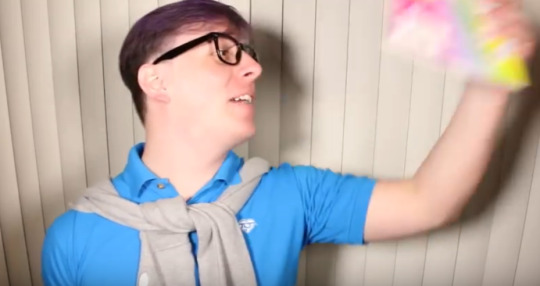
Patton is also the first one to suggest puppets as a way to resolve Thomas’ issues.
Despite the fact that Logan vehemently disagrees with this and tries to get Thomas to listen to him, Virgil interjects to get Thomas to listen to Patton instead of Logan. All of the other sides proceed with this idea. Everyone becomes puppets like Patton suggested and sings while Logan continues to express his displeasure with this format of problem solving.
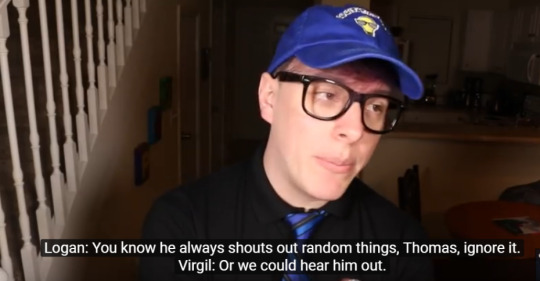
Even more interesting stuff happens in Can Lying Be Good too.
Deceit also leaves almost immediately after the real Patton arrives. Deceit’s cover had already been blown and he was still cool as a cucumber… until Patton shows up. Then, quite suddenly, Deceit looks nervously off to the side and leaves as soon as the chance arrives. Deceit certainly seems to understand that he wasn’t going to get away with anything with Patton there.
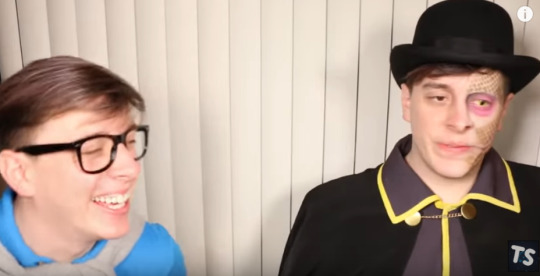
Now to be clear, I don’t think Patton was actually doing any of these things with any conscious intent. In fact, I think the fact that Patton is completely unaware of the power he holds over his fellow sides and over Thomas. I also don’t think Patton is at all trying to hurt Thomas. But that being said, I do think that because of some of Patton’s actions… he might be.
Let’s look at some interactions during Selfishness v. Selflessness.
Right off the bat Deceit pins himself against Patton. Sure, Deceit is trying to manipulate Roman right now, but Deceit understands that the two sides that will threaten his case the most are Thomas’ morality and logic. Logan is easy to isolate. Deceit doesn’t invite Logan, and once Logan is summoned, Deceit sends him away. I don’t think Deceit would have been able to get away with it if he tried to keep Patton away.
So, instead, Deceit plays it a little differently. Immediately Thomas trusts Patton to take control of the situation for him as Patton has done on many occasions.
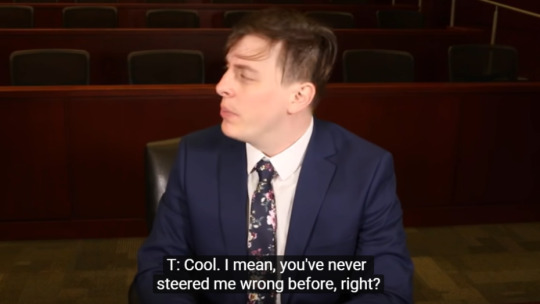
When Deceit calls Patton out for ‘manipulating’ the witness (Logan) by trying to bribe him, something very interesting happens. Virgil again interjects on Patton’s behalf. V: So he didn’t want to play by the rules of your game. Big deal! This whole thing was probably rigged anyway. It was set up by a liar! D: It takes a liar to know a liar.
Deceit glances over at Thomas after this. Deceit is calling Thomas out for lying to himself. Patton responds to Deceit earlier in this Selfishness v. Selflessness by saying “Nobody’s perfect…” then Patton hesitates and continues, “Except for Thomas! He loves his friends.”
That’s not true. It can’t be true. Because firstly, nobody is perfect. Secondly, Thomas wants to go to the callback, not his friend’s wedding. Deceit is correct when he says that Thomas “isn’t so innocent” (Selfishness v. Selflessness).
In fact, Patton must know that it can’t be true. But Patton wants it to be true. And what Patton wants matters a whole lot. Because Thomas wants to listen to what Patton wants. Deceit’s frustration is with the fact that Thomas can’t bring himself to do what he wants to do (skip the wedding), because he wants to be a good person more. Morality is more important to Thomas.
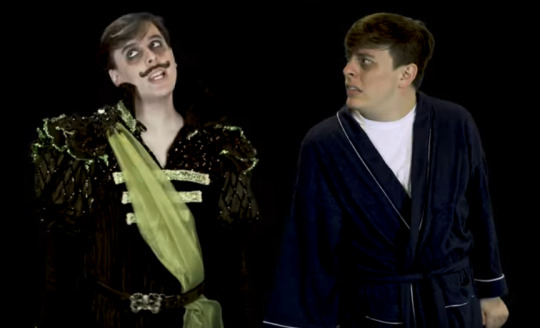
Now, this brings me to Dealing With INTRUSIVE THOUGHTS. When Thomas asks Logan how the duke is his creativity if Roman is his creativity.
L: Because of your view of creativity and imagination as a purely good force. At a young age, you filed away products of your imagination as either welcomed or forbidden. This led to the development of two separate sides of your creativity T: Wait, so, my creativity split in two!? L: Into two parts during your development, yes.
Now, normally the dark sides are, well, different sides of Thomas. Deceit encompasses Thomas’ lies and to a degree, his selfishness/self-interest. And Virgil, Thomas’ anxiety. But there isn’t any other side who occupies what is technically the same job. Because it can be presumed, that Roman and Remus were supposed to be *one side.*
But because of Thomas’ black and white views on good and bad, or welcome and forbidden, they were split. The reason the duke even exists as a dark side is because of Thomas’ strict morality. The duke is the way he is because of Patton.
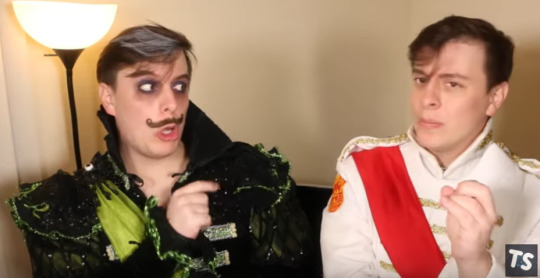
Logan points out that Patton is being too strict in Dealing With INTRUSIVE THOUGHTS. Everyone, including Logan himself, is confused by this.
Patton’s firm grip on Thomas’ moral code, with the help of Virgil’s anxiety, was leading Thomas down a path of disaster in this episode. And it seems like Patton had no clue. Patton’s position of power in the sides and over Thomas’ psyche literally caused a side to split in two, but no one seemed to question this. That’s a whole lot! That’s a big thing!
Thomas didn’t break creativity into two, his morality did that. Patton did that.
Perhaps Patton’s influence went unnoticed by Logan and the others before because Patton wouldn’t knowingly hurt anyone. Patton only wants to do what’s right, after all, he is morality itself.
But that’s just a theory A GAME THEORY
#sanders sides#patton sanders#logan sanders#deceit sanders#remus sanders#ts spoliers#sanders sides spoilers#dealing with intrusive thoughts#tw deceit#tw remus#tw the duke#the duke#mine#patton#logan#thomas sanders#virgil sanders#roman sanders#can lying be good#selfishness v. selflessness
106 notes
·
View notes
Text
Obeeeekaayyyys
So, I know the TS Sides Fandom is sometimes not altogether thrilled with Deceit as a character. I get it, trust me.
Hear me out, I'm not saying that you're wrong or that you should like him but i wanna point out some highlights that have noticed in him as a character. Which he is, a character.
Firstly, he has some snazzy style, not so personality judgment as just appreciation of nice hats and capes. I don't normally like yellow but he wears it well.
Onto more serious observations.
He is the embodiment of deceitful endeavors, but as with the others i think he is a bit more than that and I think it should or is obvious at least in the newest episode.
His makeup is of a half reptilian, snake-like appearance and half normal, how Thomas looks every day. Half of what is good and half of what is bad. While Patton embodies his morality, I believe that Deceit is either learning to or has always toed the line in the gray area. He is perceived as bad because he has a naturally deceitful nature, hence the name. But, like the others, he is looking out for Thomas in his own way, however wrong it may be.
The whole episode he seemed to be pushing for Thomas to tell the truth, which would be odd except that I believe that he is embodiment of something else, clarity. Yes, Logan us Logic and helps Thomas perceive things in a fairly unbiased light, but it is hard to do that with Logan with emotions. A lot of people say how Patton and Deceit are opposites, which make sense. Morality, Immorality. I just don't think that's all there is to it.
Deceit wants Thomas to view himself as he is, whether its good or bad, but also doens't want unneccessary emotional hardships, hence why he has had Thomas lie to himself over things. Lying to yourself can often save a lot of emotional distress. But, I believe he is starting to see that he can't always do that. Not just because the other Sides will get on him about it but because it isn't good for Thomas.
Whether you like him or not or will stop watching because you don't like what he represents is not the point here. Like I said, make your own choices.
What is the point is that though he is a "dark side", he is more in the gray area, an inbetween of the light and dark. Hence the half makeup. This is all theory, but i feel that i am onto something. I believe that he is not the inverse of any particular side already existing but rather a bridge between the darker sides and the ones we all know and love. For a while, Virgil was considered a dark side, always making Thomas anxious and insulting the others(except for patton), when really he is just an alarm system on the thomasphere. A guard if you will and as the others, he only wants the best for Thomas. I am not sure how many other sides will be introduced or how they will be but i am predicting that there are at least four others to inverse what each has to offer or even split personalities?
Imagine if you will, instead of happy go lucky patton, who admits he has his down times has an inverse, depression and irritation. All the generally bad feelings, though like patton can experience rain, they can experience sunshine. And inverse of roman, sloth and unenthusiasm. Someone who doesn't particularly care about dreams of grandeur but about taking the easy route all the time. An inverse to virgil, someone confident and smug. Not roman, though he is prideful, but rather someone who is almost vindictive in his righteousness. Lastly an inverse to logan, who unlike roman who is whimsical and creative and fanciful, is imaginative, but worse, daydreaming and preventing progress, distraction and procrastination, unfocused and completely illogical.
Again, theories. Ah how i love them. I could be wrong as hell, and i know this was supposed to be more about deceit, but i think he is neither good nor bad but represents a scale(pun very much intended). In the end, he didn't care which event Thomas went to but rather wanted him to see the truth of himself in that decision. Ultimately, Roman took the backburner and gave into the wedding, but though we all sort of knew thomas would most likely choose that, it was deceit who got him there. It showed how important thomas is to him and how much he cares by how upset and frustrated he got when no one was getting the point of the matter. Deceit isn't just lies, he is clarity. In that situation at least.
Again, do what you will, stop watching the show all because a character you didn't like showed up and created conflict. I'm not saying you're wrong or right. I have done similar before to books, movies and shows alike. I just ask that open mindedness is kept and that reading between the lines of what we are given is attempted at.
If you disagree with what i said, that is fine, i just ask that I don't get verbally harrassed or attacked (doing so will only get reported for abuse and bullying fyi) because i stated a theory that makes sense in my own head. If you don't like what i said that much, simply unfollow and block, easy as that.
Remember i am a generally reasonable person and i only ask that you be just so. If you have anything constructive to add, I'm all ears, even if I don't agree. Because it really is okay to disagree. Opinions, every has them but not everyone is going to like everyone else's.
I.E. no posts like
"No no no NO, YOU'RE WRONG, DECEIT IS TERRIBLE AND HE HAS BEEN PORTRAYED AS A VILLAIN, I CAN'T BELIEVE YOU WOULD EVEN THINK SOMETHING LIKE THAT, MORAL AMBIGUITY, HOW DENSE ARE YOU?!?!?"
Or
"Wooooowww, what a dumbass, can't you see that deceit is horrible and terrible and only causes Thomas emotional distress and upset? So what, you hate thomas now?"
Or or or
"I don't even see where you are getting your evidence from or your general theorising. You are looking for things that aren't there just because you like a generally evil character."
Or anything similar or worse to the above mentioned. Its okay to disagree, but do it in a professional non attacking manner. I.E. i disagree because of x, y, z in these instances and in this situation...etc. not calling me dumb or stupid all becaus i stated and opinionated theory. Its a theory for a reason. Something i believe could be true, though i am not one hundred percent it is.
I feel as if I should not have to explain all of this but unfortunately there are people out there who don't know how to maturely communicate their displeasure without resorting to verbal violence or insults. I never said any of you were wrong for hating him or finding him triggering. By all means, if he is triggering, which is understandable, then hate him, dislike him and if you so choose discontinue watching sanders sides so you don't subject yourself to the trigger. No one especially not me will fault you for that. Every one is different, has differing feelings on people and characters and everything. I respect that difference. Or if he is not triggering and you hate him as a character and what he does to thomas , then again, differing feelings require differing actions and thoughts.
With all of that laid out and said:
good night to all, and may many blessings come your way.
Byeeeeeee
#theories#ts sides theories#ts sides#sanders sides#deceit sanders#ts deceit#deceit theories#sanders sides theories#thomas sanders
113 notes
·
View notes